 24/10/2009 18:58 24/10/2009 18:58 |
|
| | | OFFLINE | | Post: 18.705
Post: 1.352 | Registrato il: 28/08/2005
Registrato il: 20/01/2009 | Administratore | Utente Veteran | |
|

 Saturday, Oct. 24
Saturday, Oct. 24
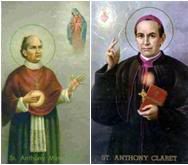 ST. ANTONI MARIA CLARET [b Spain 1807, d France 1870)
ST. ANTONI MARIA CLARET [b Spain 1807, d France 1870)
Preacher, missionary, writer, founder of Claretian order
Ordained at 28, he became a popular preacher who published
his own books. At 42, founded the Missionary Sons of the
Immaculate Heart of Mary (Claretians). Appointed bishop of
Santiago in Cuba where his work earned him the title
'Spiritual Father of Cuba. Recalled to Spain to be confessor
to Queen Isabella II and director of the school at El Escorial
monastery; continued writing books. Died while preparing
to attend the first Vatican Council.
OR today.
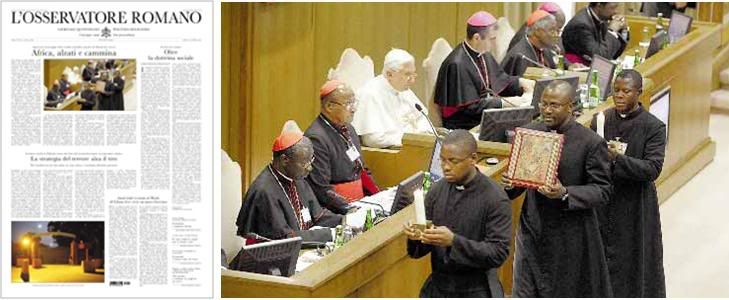
The final message from the Synodal assembly for Africa:
'Arise, Africa, and walk on!'
A front-page editorial on the conclusion of the assembly. The Holy Father attended the Friday afternoon congregation at which
the Final Propositions were read - whose publication he has authorized. Other Page 1 items: A commentary by the international
VP of Goldman-Sachs praising Caritas in veritate as beyond merely social doctrine; Taliban step up terrorist bombings
in Pakistan; Syrian president extends friendly hand to Lebanese leader unable to form a government months after the elections.
Inside, an essay by Culture Minister Gianfranco Ravasi on beauty as the other face of good, and one on evolution and divine
wisdom by a French scientist.
THE POPE'S DAY
Convivium with the Synod Fathers and assembly participants - The Holy Father invited them for luncheon at Aula Paolo VI
to 'express the common joy at the conclusion of the intense work' for the Assembly. The Pope's gift for each of the Synod
Fathers: a chasuble in green with a cross in gold and the papal coat
of arms.
The Holy Father today named, as expected, Cardinal Peter Kodwo Appiah Turkson, until now Archbishop of Capetown (Ghana),
as President of the Pontifical Council for Justice and Peace, succeeding Cardinal Raffaele Martino, retired at 77.
after servign since 2002. Cardinal Turkson was one of three President-Delegates of the Synodal Assembly that is ending.
LITURGICAL REMINDER

Oct. 25 - 30th Sunday of Ordinary Time
10:00 St. Peter's Basilica
CAPPELLA PAPALE
Closing Mass of the Second Special Assembly for Africa
of the Synod of Bishops
Sorry for my very late start today.
[Modificato da TERESA BENEDETTA 24/10/2009 19:40] |
| |
|
| |
 24/10/2009 19:40 24/10/2009 19:40 |
|
| | | OFFLINE | | Post: 18.706
Post: 1.354 | Registrato il: 28/08/2005
Registrato il: 20/01/2009 | Administratore | Utente Veteran | |
|

 Pope names Ghana cardinal
Pope names Ghana cardinal
to head Vatican's peace office
as Synodal assembly for Africa
draws to a close
By NICOLE WINFIELD

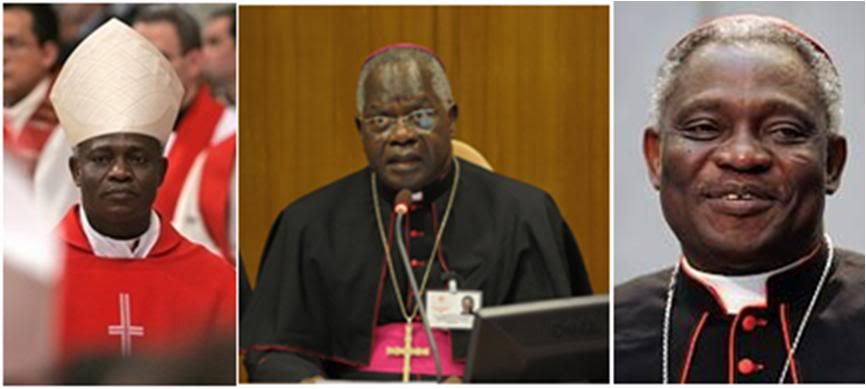
VATICAN CITY, Oct. 24 (AP) – The Pope appointed Cardinal Peter Turkson of Ghana to head the Vatican's justice and peace office Saturday, a high-profile post that cements his reputation as a possible future papal candidate.
The office is responsible for promoting the church's social teachings on justice issues, such as war, the death penalty and human rights. Turkson told reporters three weeks ago there was no reason there couldn't be a black pope, particularly after Barack Obama was elected U.S. president.
Turkson's appointment to his new post was announced at the end of a three-week Vatican meeting on the role of the Catholic Church in Africa, which Turkson had headed.
In their discussions, the 300 bishops and cardinals tackled the pressing issue of AIDS on the continent, including the question of whether married couples could use condoms if one spouse is infected.
While the Vatican has no specific policy concerning condoms and AIDS, the Catholic Church opposes the use of condoms as part of its overall teaching against artificial contraception. It advocates sexual abstinence and marital fidelity as the best way to combat the spread of HIV.
In their final recommendations to the Pope, the bishops made no mention of condoms, leaving it up to the couples themselves to decide how to prevent infection. Asked at a news conference if this marked a deviation from Church teaching, Turkson replied that the Vatican still had no firm policy on the matter.
"That issue is still being discussed," Turkson said. "I don't know when this discussion will come to an end, but I'm aware such a discussion is going on in the Congregation for the Doctrine of the Faith."
In 2006, the Vatican's top health care official confirmed his office was studying whether condoms can be condoned in the case of a married couple where one spouse is HIV-positive. Since then, there has been no indication the issue was still on the table until Turkson's comments.
In the final recommendation, the bishops called for pastoral care for couples dealing with an infected spouse to help form their consciences "so that they might choose what is right, with full responsibility for the greater good of each other, their union and their family."
Other issues in the document include:
_An urgent call for starting religious dialogue with followers of Islam and African traditional religions.
_A recommendation that each African bishop name an exorcist to deal with sorcery and witchcraft, which are part of traditional African religions and cultures.
_A denunciation of an African Union agreement known as the Maputo Protocol that says abortion should be legal in cases of rape, incest or when the mother's life is endangered.
_A call for a day for reconciliation every year.
But the biggest news to come at the end of the synod was Turkson's appointment, which drew a round of applause when Pope Benedict XVI announced it at a luncheon with the 300 bishops, priests and others attending the synod.
The 61-year-old archbishop of Cape Coast replaces Italian Cardinal Renato Martino, who is retiring.
Up until now, the most prominent African cardinal mentioned as a possible first black Pope was Cardinal Francis Arinze of Nigeria. But he retired from the Vatican office in charge of rules for celebrating the liturgy around the world last year, and will celebrate his 77th birthday next week, making him an unlikely choice. [That's an inappropriate conclusion. Until after he turns 80, any cardinal is eligible and just as likely as any other of his peers to be elected Pope.]
Speculation has swirled for years about the possibility of a Pope from the developing world because that is where the Church is growing fastest.
I think that speculation about a black Pope as though it was ever an impossibility in the Catholic Church (from the moment there was a black cardinal) is both anachronistic and unseemly. She didn't need Barack Obama as a precedent. As someone has pointed out, the Church had its first black cardinal back at a time when blacks still rode the back of the bus in the American South. Does anyone really think the Holy Spirit works the divine will on the basis of anyone's skin color or nationality?
|
| |
 24/10/2009 21:37 24/10/2009 21:37 |
|
| | | OFFLINE | | Post: 18.707
Post: 1.355 | Registrato il: 28/08/2005
Registrato il: 20/01/2009 | Administratore | Utente Veteran | |
|
  Benedict XVI grateful
Benedict XVI grateful
for Synodal assembly's work
in behalf of Africa
Translated from
the 10/25/09 issue of

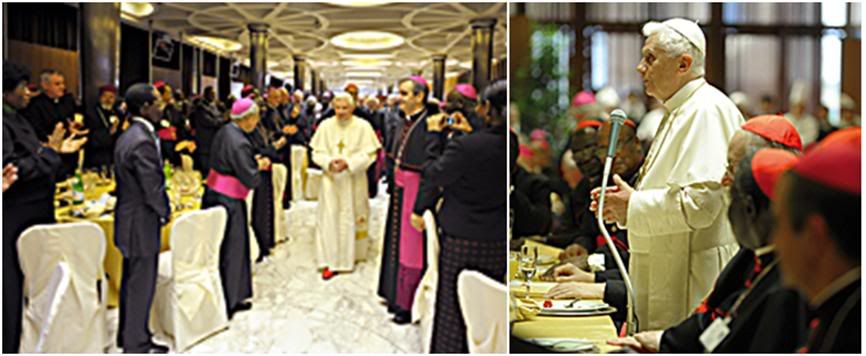
At the end of the 20th General Congregation on Saturday morning, Benedict XVI lunched with the Synodal fathers and all the guests and staff workers of the Second Special Assembly for Africa of the Bishops' Synod in the atrium of Aula Paolo VI.
At the end, the Holy Father gave brief remarks, saying:
"Now, it is time to say thank you. Thanks to the Lord above all who has convoked us, has brought us together, has helped us to listen to his Word, the voice of the Holy Spirit.
"Thus he has given us the possiblity to find the road of unity amid a multiplicity of experiences, the unity of faith and communion in the Lord.
"That is why the expression 'The Church family of God' is no longer just a concept, an idea - but the living experience during these weeks. We are all truly gathered together as the family of God."
He added: "We have done good work, with the help of the Lord", although, he said, it is not an easy challenge, with two dangers:
"The theme of reconciliation, justice and peace' certainly implies a strong political dimension, even if it is evident that reconciliation, justice and peace, are not possible without a profound purification of the heart, without a renewal of thought, a metanoia, without something new that should result precisely in an encounter with God.
"But even if it is so, if this spiritual dimension is profound and fundamental, the political dimension too is very real, because without political realization, these novelties from teh Holy Spirit are generally not realized.
"that is why the temptation would be to politicize the issue, to speak less as pastors but as politicians - on a competence that is not ours."
To avoid politicization, the Pope pointed out the other danger,
which is to retreat to a purely spiritual world, abstract and beautiful but not realistic: "The discourse of a pastor must be realistic, it must touch reality, but in the perspective of God and his Word."
His mediation consists in being, on the one hand, being truly attentive to reality, and on the other, not falling into technically political situations.
The task, he said, is to "indicate concrete ways which are also spiritual". This was a problem that the Synodal assembly had to overcome, and "thanks to God, we have succeeded in doing so".
"For me, this is also a reason to give thanks, because it will greatly facilitate elaborating the post-synodal document."
The Pope then tanked the three President delegates "who moderated the sessions with great mastery and with joy", and to the relators or secretaries, w"who bore the greatest weight of work", even at nights, on Sundays and during lunch hours, "who therefore deserve great applause from us".
Even greater applause when the Holy Father announced that he has named Cardinal Peter Turkson President of the Pontifical Council for Justice and Peace, to succeed Cardinal Raffaele Martino:
"Thank you, Your Eminence, for having accepted. We are very happy to have you among us soon. And thanks to all the Fathers, teh fraternal delegates, the auditors and experts....and especially, to the Secretary-General [Mons, Nikola Eterovic] and his team, who have organized all this and guided us all very well."
The Pope concluded:
"The Synod ends but does not end. The work proceeds not only with the post-synodal exhortation. Synodos means 'common journey'. Let us stay on a common journey with the Lord, let us walk ahead to prepare the way for him, to help him open up the doors of the world so he can build his kingdom among us."
The Press Office has not yet posted the text of the Holy Father's remarks, but the latest Synod Press Bulletin has the English translation of the words of gratitude addressed to the Holy Father by Cardinal Theodore Adrien Sarr, Archbishop of Dakar (Senegal) at the luncheon. He spoke in French:
TRIBUTE TO THE HOLY FATHER
BY CARDINAL SARR
Most Holy Father,
At the closing of the Second Special Assembly for Africa of the Synod of Bishops, the Cardinals, Archbishops and Bishops of Africa, Madagascar and adjacent islands, with all the faithful of Christ in their dioceses - priests, religious and laity - renew their deep gratitude to you, which they expressed on many occasions, before as during the Synodal Assembly.
They are grateful to you for having reconfirmed your predecessor’s, the dear Pope John Paul II, intention of convoking a Second Special Assembly for Africa of the Synod of Bishops, and of having called it with the theme “The Church in Africa at the Service of Reconciliation, Justice and Peace. ‘You are the salt of the earth. You are the light of the world’ (Mt 5:13,14)”.
In particular they thank you for having marked with your physical presence most of the general congregations of the Synodal Assembly. They thank you for the paternal attention, regard and solicitude thus manifested towards Africa and its populations, to the Churches of this continent and all of its members, from the opening Mass on October 4th 2009, with the rich and very encouraging words of your homily, which will remain as a reference.
They continue to raise, towards God the Father, Son and Holy Spirit, a fervent act of thanks for the fraternity of our Assembly of disciples of Christ, for the quality of reflection and exchange during these three weeks, for the fervor of prayer, which has sustained us, as well as for the enrichments and consciousness that the Divine Spirit incited in us through personal reflection and fraternal exchange.
They continue to ask for the grace of a “new Pentecost” for all the Churches of the Continent and adjacent isles, so that all their members - bishops, priests, religious and laity - may experience the encounter with the Risen Christ better and forever, and allow themselves to be evermore transformed by Him and commit to give of themselves generously for the promotion of Reconciliation, Justice and Peace, in the ecclesial communities on all levels, as well as in the different spheres of life and work in the different countries.
Most Holy Father, the Fathers of this Second Special Assembly for Africa of the Synod of Bishops, in the joyous feeling of having lived these three weeks close to you, weeks of prayer, reflection and exchange, and already turning towards the fields of our daily ministry, we implore your apostolic blessing on the persons, families and different communities of their dioceses, as well as on their countries and all of their populations.
Tomorrow's issue (10/25/09) of L'Osservatore Romano also carries a wrap-up story on the 57 Propositions approved by the Synodal assembly:
The expectations of
the African continent
Translated from
the 10/25/09 issue of

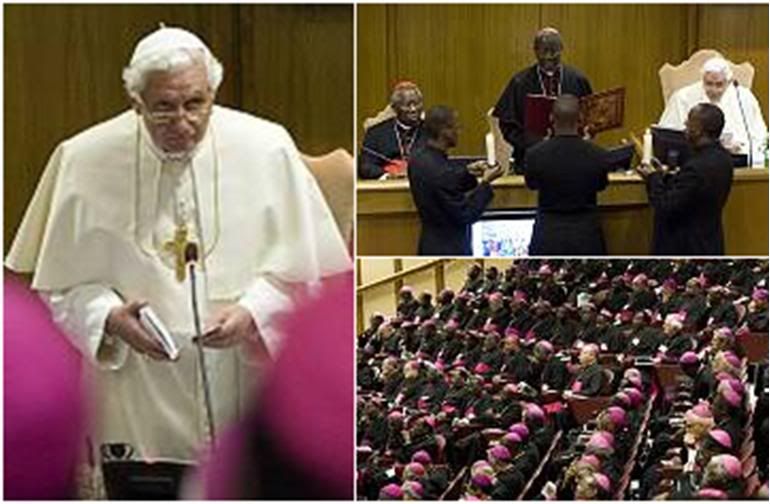
With 57 propositions - read by the Secretary-General, Cardinal Turkson, and voted on, Friday afternoon and Saturday morning - the Synodal Fathers asked the Pope to avail of a document on the Church in Africa in the service of reconciliation, justice and peace: a text that will summarize the work of the Synod and offer indications and perspectives for the future of the continent.
These propositions to the Pontiff, the Ghanaian cardinal said, would add to a body of texts that includes the Lineamenta, Instrumentum laboris, the general relations before and after the Synodal discussions, all the texts of the interventions presented orally and in writing, as well as the discussions and reports of the working groups.
The text of the 57 propositions was presented by Cardinal Turkson and the two special secretaries, Archbishop Antonio Damião Franklin and Bishop Edmond Djitangar, at a news conference Saturday morning.
At the start of the news conference, the Holy Father's appointment of Cardinal Turkson as the new President of the Pontifical Council for Justice and peace, was announced. Because he has to wrap up his pastoral work in Ghana, he will not formally take office in the Curia until January 6, 2010.
The propositions convey to the Holy Father that the participants experienced the Synodal assembly as a new Pentecost, just as the first special synodal ssembly for Africa in 1994 was one of resurrection and hope.
The first proposition aims at achieving better ecclesial communion on every level, encouraging cooperation within the Church itself. It would involve renewing existing ecclesial structures but also of promoting others. They ask the Pope to establish continent-wide councils for the clergy, for lay faithful and for Catholic women.
In this connection, they ask for practical ways to institute more adequate formation of priests, religious and laymen in their specific roles, along with a more professional and quick-responding Cattholic presence in the mass media.
The 57 propositions substantially synthesize all the key points discussed during the three-week synodal assembly. They reaffirm ideas like the irreversibility of the ecumenical and inter-religious dialog, with a special approach to Islam. They urge overcoming any form of discimination, intolerance and religious fundamentalism, and making provisions for trans-national collaboration on social issues and reconciliation.
They make concrete proposals to African governments that they may, once and for all, undertake the road to reconciliation, justice and peace. More specifically, to do everything to fight poverty, eradicate violence, exploitation, injustices, and corruption. For its part, the Church must put its social doctrine into practice with the utmost efficiency and efficacy.
Even as they encourage participation of Catholics in public life, they also believe the Church must assure adequate spiritual, doctrinal, pastoral and practical formation for Catholics who take on political and economic responsibilities.
Among the measures would be to set up faculties of political science in the Catholic universities of Africa.
Among the new ideas is the creation of an international solidarity fund through Caritas Inteernational, and of an African program for peace and solidarity that can help find solutions to the conflicts on the continent, as well as the formation of councils for peace that are well-provided with staff and means.
They propose to support an ongoing United Nations study for an international treaty on the arms trade with the aim of a total ban on nuclear and biological weapons and other weapons of mass destruction.
Also strongly stressed is a call for total and universal abolition of the death penalty with the denunciation that such a measure, when it is unappealable, most strikes at poor people who cannot defend themselves even when the death penalty is used by politicians to eliminate their opponents.
Likewise, they urged government to adopt penal reforms which will guarantee minimum international standards for the treatment of all prisoners.
The Synodal assembly was particularly concerned about the AIDS epidemic, saying it is not simply a medical-pharmaceutical issue but a question of integral development and justice. They claim that AIDS patients in Africa are not getting the same quality of care as in other countries. Also, that AIDS assistance funds often do not reach their designated beneficiaries. One proposition recommends preparation of a manual for pastoral healthcare workers.
The propositions reaffirm a rejection of abortion and a defense of life at every stage from cocneption to natural death.
Likewise, the Synodal fathers denounce violations against children and women, and the lack of in-country oppportunities for young people who are then constrained to emigrate. They ask for a review of restrictive international laws on immigration so as not to discriminate against Africans in a way that violates their human rights.
The unofficial English text of the Propositions may be found on:
www.vatican.va/news_services/press/sinodo/documents/bollettino_23_ii_speciale-africa-2009/02_inglese/b33...
10/25/09
P.S. The Press Office posted the text of the Pope's after-luncheon remarks today. Here is a translation:
REMARKS BY THE HOLY FATHER
after luncheon with Synod
participants and staff
10/24/09
Dear brothers and sisters,
The time has come to say Thank you. Thanks to the Lord above all who called us, brought us together, and helped us to listen to his
Word, the voice of the Holy Spirit, and thus has given us the possibility to find the road to unity in the multiplicity of experiences, unity in faith and communion with the Lord.
And so the expression "Church as the FAmily of God' is no longer just a concept, an idea, but is the living experience of these weeks: we have truly been united here as the Family of God. And whe have done good work, with the help of the Lord.
The theme [of the Synodal assembly] was in itself not an easy challenge, with what I would call two dangers. The theme of 'reconciliation, justice and peace' certainly implies a strong political dimentsion, even if it is evident that reconciliation, jstice and peace are not possible without profound purification of the heart, without a renewal of thought, a metanoia, without a newness that should result precisely from an encounter with God.
But even if this spiritual dimension is profound and fundamental, the political dimension is very real, because without political realization, the novelties of the Spirit generally are not realized. So, there may be a temptation to politicize the question, to speak less as pastors and more as politicians, therefore, with a competence that is not ours.
The other danger - precisely to avoid that temptation - was to retreat into a purely spiritual world, beautiful and abstract, but not realistic. The discourse of a pastor, however, must be realistic, it must touch reality, but in the perspective of God and his Word.
Therefore, the pastor's mediation involves, on the one hand, to be truly linked to reality, careful to speak of what is, and on the other hand, one must be careful not to fall into solutions that are technically political - and this means, giving a concrete word that is also spiritual.
This was the great problem of the Synod, and I think that, thank God, we successfully resolved it - and for me, this is also a reason to be thankful, because it will facilitate very much the elaboration of the post-Synodal document.
I wish now to get back to the Thank-you's. I thank above all the president delegates, who moderated with great mastery and even with joy, the sessions of the Synod.
I thank the relators: We have seen and even touched first hand, so to speak, that they bore the greatest weight of the work - they have worked at night, even on Sundays, they have worked during the lunch breaks, and now they deserve great applause from us.
I can communicate here that I have decided to name Cardinal Turkson as the new President of the Pontifical Council for Justice and Peace to succeed Cardinal Martino. Thank you, Eminence, for having accepted. We are happy that you will soon be among us.
Thanks to all the Fathers, to the fraternal delegates, to the augditors and experts, and thanks especially to the translators for thei role in our attempt to 'create a Pentecost'. Pentecost means to understand each other - and without translators, we would not have this bridge of understanding. Thank you!
And thanks above all to the Scretary-General, to his team, which has guided us and silently organized everything very well.
The Synod ends but does not end - not only because the work will go ahead with the post-Synodal exhortaiton. 'Synodos' means a common jounrye. Let us stay on the common path with the Lord, let us go before the Lord to prepare the way for him, to help him, to open for him the doors of the world so that he may create his Kingdom among us.
In this sense, my blessing goes to all of you. Let us now say the prayer of thanks for the meal we had.
[Modificato da TERESA BENEDETTA 26/10/2009 01:14] |
| |
 25/10/2009 00:45 25/10/2009 00:45 |
|
| | | OFFLINE | | Post: 18.708
Post: 1.356 | Registrato il: 28/08/2005
Registrato il: 20/01/2009 | Administratore | Utente Veteran | |
|
 This story, and the Times' original headline for it - start off with the negatives, but the former Archbishop of Canterbury actually sees what may be good in Pope Benedict's opening to disaffected Anglicans.
Former Archbishop of Canterbury 'appalled'
This story, and the Times' original headline for it - start off with the negatives, but the former Archbishop of Canterbury actually sees what may be good in Pope Benedict's opening to disaffected Anglicans.
Former Archbishop of Canterbury 'appalled'
by Pope's 'treatment' of his successor -
but sees the positive aspects nonetheless
by Ruth Gledhill

Oct. 24, 2009
Lord Carey of Clifton has called on his successor as Archbishop of Canterbury to complain to the Pope in person about not being consulted over plans to admit disaffected Anglicans to the Roman Catholic Church.
Lord Carey warned that the Pope’s strategy could damage relations with the Vatican. Lord Carey, who stepped down in 2002, urged Dr Rowan Williams to protest strongly when he visits the Pope in Rome next month.
Lord Carey was speaking after the joint press conference this week between Dr Williams and the Catholic Archbishop of Westminster, the Most Rev Vincent Nichols, to announce the move.
Under an apostolic constitution decree, the Pope will set up personal ordinariates, or extra-geographical Roman Catholic dioceses, such as those that already exist in the military, to take in former Anglicans who oppose women bishops and accept the Petrine ministry of Rome.
Dr Williams appeared distressed when he said at the press conference, hosted by the Roman Catholic Church in Eccleston Square, that he had known nothing of the initiative until two weeks ago.
He was notified formally only when Cardinal William Levada, Prefect of the Congregation for the Doctrine of the Faith, visited last weekend to fill in some of the detail.
The Times understands that the former Archbishop of Westminster, Cardinal Cormac Murphy-O’Connor, a former co-chairman of the Anglican-Roman Catholic International Commission, known as Arcic, tried unsuccessfully to stop the apostolic constitution being published. His protests and others’ concerns delayed its publication, intended for last February.
The two archbishops presented the constitution as “a response by Pope Benedict XVI to a number of requests over the past few years to the Holy See from groups of Anglicans who wish to enter into full visible communion with the Roman Catholic Church”.
They said: “The announcement ... brings to an end a period of uncertainty for such groups who have nurtured hopes of new ways of embracing unity with the Catholic Church.”
Lord Carey said that he, too, had been caught unawares by the development, which some insiders believe has dealt a death blow to 40 years of official ecumenical dialogue under the auspices of the Council for Christian Unity, if not to the Anglican Communion itself. The council was not involved in preparing the constitution.
[Why should it have been? ARCIC is the quintessential institution geared only for dialog, almost for perpetual dialog, because it sees reunification in terms of all or nothing, and has not geared itself at all for partial but concrete gains. As an interim measure directed at specific Anglican groups who have requested to rejoin Rome, the Apostolic Constitution is the business of Rome alone!]
He sought, however, to make the best of the development.
“I give it a very cautious welcome,” he said. “It is worth considering because there are a number of deeply worried, anxious Anglo-Catholics who do not believe they have a constructive future in the Church of England with the ordination of women as bishops.
“I was pastorally concerned for them when I was Archbishop of Canterbury. I know Rowan is as well. So this could go a long way to helping.” [So why indulge in a petty fit of pique because there was not enough 'consultation'? When Williams decided last summer that he was going to allow two 'tracks' in the Anglican Communion, he basically decided that women/homosexual priests and bishops were acceptable and legitimate in the Anglican Communion even if a significant number of its members opposed these practices as a betrayal of Christian Biblical teaching. No principled Christian could possibly accept such a decision that exacerbated the split within the Communion instead of resolving it.]
The Times has learnt it was reports of bishops emerging in tears from the General Synod meeting last July that rejected all provision for traditionalists that finally provoked Rome into offering them a home.
Lord Carey said that there were two positive aspects to the new Apostolic Constitution. “This initiatve is almost a back door ecumenical gesture. What we have seen is the failure of the final report of Arcic. Straightforward ecumenism at the theological level is going nowhere. This fresh initiative could have surprising consequences.”
George Austin, former Archdeacon of York, said: “ Rome has done this cleverly because the Catholic bishops in England are liberal. The Pope has shown considerable leadership. That is what Popes do. What has surprised me is the sort of people, and number, who have said they will leave.”
Moment of truth
for Anglo-Catholics

Oct. 24, 2009

Be careful what you ask the Pope for, because he might just give it to you. That’s the truth slowly sinking in to attendees at the annual conference of Forward in Faith, held in London today.
For ages, many Anglo-Catholics have said they would come over to Rome, but on their own terms (not unreasonable ones, in my opinion). And now the Vatican has said: OK, you can have your own church-within-a-church, only for form’s sake we can’t call it that.
Uh-oh. Suddenly one or two Anglo-Catholics who used to bleat on about how the only obsctacle to coming over was the ghastly RC bishops’ conference are having second thoughts, even though that ghastly conference has been written out of the picture.
On the other hand, other Anglicans whom you would never expect to be attracted by a Roman offer are taking it seriously, so dramatic are its contents.
The “flying” Bishop of Ebbsfleet, Andrew Burnham, told the Forward in Faith meeting today: “We are Western Christians, Catholics of the Latin Rite, separated from the Holy See.”
Well, now there’s a way to demonstrate that. It’s already clear that Burnham and most of the big guns in the Anglo-Catholic movement will join the Personal Ordinariate, surmounting practical problems. Most young priests will do likewise, I suspect.
Many lay people will be less keen, in some cases because (as one disillusioned Catholic convert put it yesterday) they’re as attached to their church buildings as they are to their faith.
We shouldn’t expect a definitive response from Anglo-Catholics for some months. But my gut feeling is that the Personal Ordinariate will work, and work well, though its final shape may surprise us. More on this later.
Other reports of the FIF meeting indicated a lot of surprising hostility - but now I have to seek out where I read that earlier today.
Also, John Allen's Friday column was a really lengthy discussion of the Anglican initiative, and here's the link:
ncronline.org/news/what-vaticans-welcome-anglicans-means
Too much could-be/would-be! I think, for now, we should sit back a bit, think back more leisurely over what we know now about what is after all an unprecedented development, and get ready for what the Apostolic Constitution will actually say - and all the explanations we will need afterwards, based on what is actually there, not on what one now thinks there may be.]
[Modificato da TERESA BENEDETTA 25/10/2009 02:11] |
| |
 25/10/2009 10:37 25/10/2009 10:37 |
|
| | | OFFLINE | | Post: 18.709
Post: 1.357 | Registrato il: 28/08/2005
Registrato il: 20/01/2009 | Administratore | Utente Veteran | |
|
 This essay was on Page 1 of the OR for 10/24/09.
'Caritas in veritate':
This essay was on Page 1 of the OR for 10/24/09.
'Caritas in veritate':
Beyond social doctrine
by Lord Brian Griffiths of Fforestfach
Vice-President, Goldman Sachs International
Translated from
the 10/24/09 issue of

The supporters of economic liberalism had a tepid welcome for the encyclical Caritas in veritate. They acknowledge its positive support for profit, the free market economy, globalization, technology and international commerce.
Some consider it a mix of good and bad things, because it calls for greater international aid, strengthening the power of labor unions. and the management of globalization by international institutions.
Some consider it a step backward with respect to Centesimus annus because it does not pay homage to entrepreneurs adn the entrepreneurial culture.
Some argue that social and economic questions having become so complicated, the time is past for encyclicals proposing the social doctrine of the Church.
I strongly disagree.
This encyclical is an extraordinarily incisive document. It has firmly placed the Christian faith as a vision of the world on the international agenda.
It faces all the key issues of our time - the financial crisis, global poverty, the environment, globalization, technology - and shows that the Christian faith can offer a unique perspective on each of these issues.
I cannot call to mind any other writing of an individual Christian nor a text by any other Church that can have its impact.
The great strength of this encyclical is its theology. It draws from profound reflections on Christian teaching that Benedict XVI has elaborated over six decades and demonstrates the importance of the Christian faith today.
For example, even as it recognizes that the environment is a gift of God to mankind and that we are its administrators, it rejects pantheism and the idea that nature is an untouchable taboo.
It affirms that work has innate dignity, which comes from our being creatures of God, but that it is violated by teh growing unemployment resulting from the crisis. The market economy creates prosperity but without trust, as during this crisis, then social cohesion is undermined.
The theology of the encyclical is above all Christ-centered. The life of Jesus is, in fact, the supreme example of "love filled with truth'. Echoing Paul VI, Benedict XVI affirms that life in Christ is "the first and principal factor of development", and that the Christian faith, concerning itself with development, does not count "on privileges or positions of power, and not even on the merits of Christians, but only on Christ... The Gospel is a fundamental element of development."
While I was reading the encyclical for the third time, I started to understand that its theological intuitions are so profound that it should be read not only on the intellectual plane as a formulation of social doctrine. but also in a meditative manner, because it offers a profound vision of the human being.
Caritas in veritate brings its greatest challenge to the dominant vision of the world inspired by economic liberalism and philosophical libertarianism, which have elevated personal freedom to be absolute.
The encyclical categorically rejects the vision that economic life is autonomous and that it can be independent of the moral. The present financial crisis is partly the collapse of a system, seen mechanically, but is also the continuing presentation of a moral tragedy.
Economic life is made up of individuals with a moral conscience and personal responsibilities that require a moral compass for guidance. Consequently, they cannot be conceived as something impersonal and amoral, like a spontaneous order that left to itself would produce the common good.
Thus, the defense of the free market on the part of secular economists like Friedrich Hayek e Milton Friedman is flawed by their imperfect vision of the human being and by their limited understanding of the moral foundation of markets.
The encyclical is an argument in favor of Christian humanism. The human being with his dignity deserves justice, and brings the divine image where it should always be at the center of economic life.
The benchmark of every reform is its impact on persons, on their relationships and on their communities. That is why the encyclical does not suggest an economic system alternative to capitalism.
In fact, it supports something more radical: e global market economy that is pervaded with charity and justice, respectful of the world created by God and of human beings, who bear God's image.
"Development is impossible without upright men, without economic workers and political men who strongly live in their consciences the call to the common good".
The encyclical considers this a realistic project and not an impossible ideal. The financial crisis has created a crossroads for all of us, for the financial institutions in which we work, and the societies in which we live.
Caritas in veritate is an exhortation addressed to Christians so they may renew their vision of what is possible, to live this with the help of God, and doing so, to serve the world with love.
Shortly after CIV came out last July, Lord Griffiths wrote an outstanding appreciation for the Times of London, and although I posted it on this thread at the time, I am reposting it here as a companion piece to the OR essay for his reading of the encyclical in his capacity as a financial and economic expert:
Pope Benedict is
the man on the money
The best analysis yet of the global economic crisis,
tells how people, not just rules, must change
by Brian Griffiths

July 13, 2009
Lord Griffiths of Fforestfach is a trustee of the Archbishop of Canterbury’s Lambeth Trust and Vice-Chairman of Goldman Sachs International. He was an economic adviser to British Prime Minister Margaret Thatcher. A devout evangelical Christian, he is, by virtue of his title, a member of the House of Lords.
P.S. today: Too bad the OR did not see fit to provide more biodata on Lord Griffiths other than his being VP of Goldman Sachs International.
When Cardinal Ratzinger was elected Pope, his strengths and weaknesses seemed clear. Here was an eminent theologian, philosopher and guardian of Christian truth, but a man unlikely to make the Church’s message relevant to the world today.
How simplistic this now looks in the light of his third encyclical, in which Pope Benedict XVI confronts head-on the financial crisis that has rocked the world.
The language may be dense, but the message is sufficiently rewarding. The encyclical analyses modern capitalism from an ethical and spiritual perspective as well as a technical one.
As a result it makes the (UK) Government’s White Paper on financial reforms published two days later look embarrassingly one-dimensional and colourless.
It is highly critical of today’s global economy but always positive. Its major concern is how to promote human development in the context of justice and the common good.
Despite heavy competition from some of the world’s finest minds, it is without doubt the most articulate, comprehensive and thoughtful response to the financial crisis that has yet appeared. It should strike a chord with all who wish to see modern capitalism serving broader human ends.
The Pope makes it clear that the encyclical takes its inspiration from Populorum Progressio, the encyclical published by Paul VI in 1967, at the height of anti-capitalism in Europe. It attacked liberal capitalism, was ambivalent about economic growth, recommended expropriation of landed estates if poorly used, and enthused about economic planning.
It was in stark contrast to Centesimus Annus (1991), the most recent encyclical dealing with economic matters, published after the fall of communism by a Polish Pope.
John Paul II affirmed the market economy as a way of producing wealth by allowing human creativity and enterprise to flourish.
Pope Benedict is highly critical of modern capitalism.
- He believes that the international economy is marked by “grave deviations and failures”.
- Economic growth is weighed down by “malfunctions and dramatic problems”.
- Businesses that are answerable almost exclusively to their investors have limited social value.
- The financial system has been abused by speculative financial dealing and has wreaked havoc on the real economy.
- Globalisation has undermined the rights of workers, downsized social security systems and exploited the environment.
- As global prosperity has grown, so has “the scandal of glaring inequalities”.
Despite these criticisms, the encyclical has a positive view of profit, providing it is not an exclusive goal.
- It recognises that more labour mobility resulting from deregulation can increase wealth.
- It accepts that economic growth has lifted billions out of poverty and enabled some developing countries to become effective players in international politics.
- Globalisation offers an unprecedented chance of large-scale redistribution of wealth worldwide.
The kind of market economy Pope Benedict defends is much closer to the European social model than the “spontaneous order” of Milton Friedman and Friedrich Hayek.
For him, market capitalism can never be conceived of in purely technical terms. Development is not just about freeing up markets, removing tariffs, increasing investment and reforming institutions. It is not even about social policies to accompany economic reforms.
At the heart of the market is the human person, possessing dignity, deserving of justice and bearing the divine image. The market needs to be infused with a morality emanating from Christian humanism, which respects truth and encourages charity.
The encyclical suggests six major ways to make global capitalism more human.
First, it calls for “the management of globalisation” and a reform of international economic institutions. They are needed “to manage the global economy, to revive economies hit by the crisis, to avoid any deterioration of the present crisis . . . to guarantee the protection of the environment and to regulate migration”.
Not surprisingly, for this huge task we need “a true world political authority” through reform of the United Nations.
Next, there needs to be greater diversity among the enterprises that create wealth: mutual societies, credit unions and hybrid forms of commercial organisation.
Third, globalisation has weakened the ability of trade unions to represent the interests of workers, something that needs to be reversed.
Fourth, the scandal of inequality requires countries to increase the proportion of GDP given as foreign aid.
Fifth, because the environment is the gift of the Creator we have an inter-generational responsibility to tackle climate change.
Finally, everyone involved in the market, traders, producers, bankers — even consumers — must be alert to the moral consequences of their actions.
“Development is impossible without upright men and women, without financiers and politicians whose consciences are finely attuned to the common good.”
Pope Benedict’s words are not just platitudes. They affect every person at work every day. In the City [London's financial center], they are a challenge to management to create a culture of prudence, responsibility and integrity.
There has to be zero tolerance for misleading clients, fudging conflicts of interest and inflating valuations. However great the revenue they produce, those who deviate must be disciplined. This kind of ethos cannot be imposed by regulation alone.
At the time I first posted the above, I said that if the Nobel juries were not ideologically driven, I would have sent Griffith's essay to nominate Benedict XVI for the Nobel Prise in Economics, and I still think so.
[Modificato da TERESA BENEDETTA 25/10/2009 10:42] |
| |
 25/10/2009 11:39 25/10/2009 11:39 |
|
| | | OFFLINE | | Post: 18.710
Post: 1.358 | Registrato il: 28/08/2005
Registrato il: 20/01/2009 | Administratore | Utente Veteran | |
|

 Sunday, October 25
Sunday, October 25
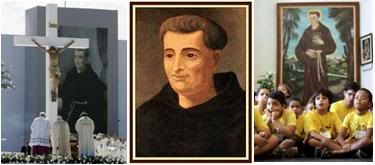 ST. ANTONIO DE SANT'ANNA GALVAO (Frei Galvao) (Brazil, 1739-1822
ST. ANTONIO DE SANT'ANNA GALVAO (Frei Galvao) (Brazil, 1739-1822
Franciscan, First Brazilian saint
Exemplary priest and famous preacher, he founded the Sisters of the Conception
of Divine Providence. He was canonized in Sao Paolo by Benedict XVI in May 2007.
OR today.
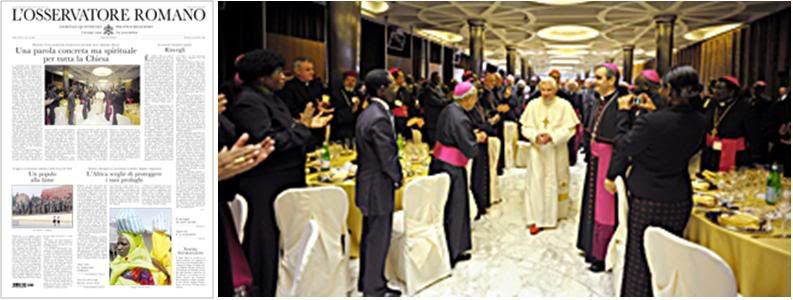
Benedict XVI thanks the Synodal Assembly for its good work:
'A concrete but spiritual message for the whole Church'
Other Page 1 stories: An editorial on the concluded Synodal assembly calls for the media to wake up and pay Africa the attention
it deserves; the African Union adopts a convention to protect the continent's refugees, displaced and repatriated persons; and
a story on hunger in North Korea.
THE POPE'S DAY
Closing Mass of the Synodal assembly for Africa
and
Sunday Angelus
|
| |
 25/10/2009 12:02 25/10/2009 12:02 |
|
| | | OFFLINE | | Post: 18.711
Post: 1.359 | Registrato il: 28/08/2005
Registrato il: 20/01/2009 | Administratore | Utente Veteran | |
|
 CLOSING MASS
CLOSING MASS
Second Special Assembly for Africa
of the Bishops' Synod
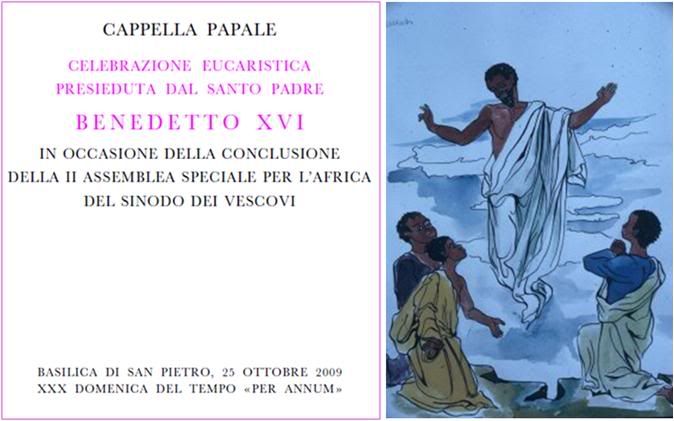 Illustrations for Mass libretto by African artists. Cover: The Transfiguration
Illustrations for Mass libretto by African artists. Cover: The Transfiguration
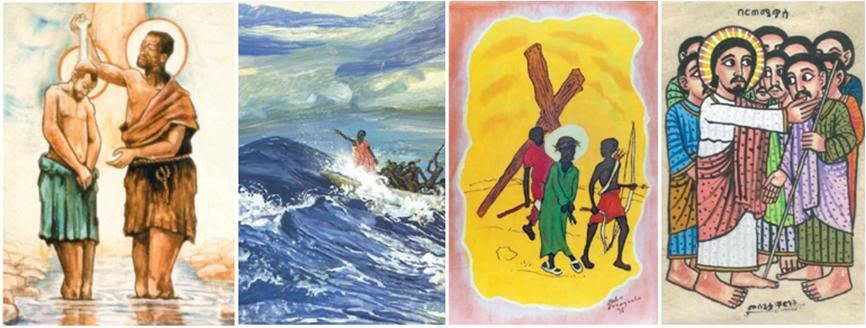

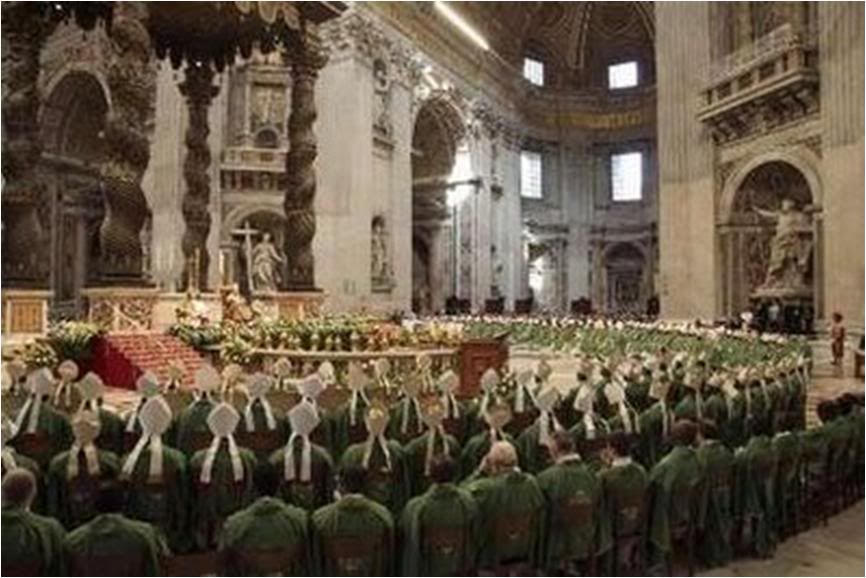
Pope calls Africa to
'Take courage, stand up'
as synod ends

ROME, Oct. 25 (dpa) - With a call to courage, Pope Benedict XVI ended a three-week long synod on Africa Sunday, telling attendees to seek the courage to find peace.
"Take courage, Africa, stand up!" appealed the Pope, telling the continent to seek "a peace that opens everyone of good will to overcome religious, ethnic, language and cultural differences."
In its final document, the synod urged Africans to work together for the continent's political-economic future. It added that the negative consequences of Africa's history of colonialism and the slave trade could no longer be used to excuse Africa's lack of development.
In effect, Africans must now set challenges for themselves and create conditions that respect human dignity.
Benedict repeated comments from an encyclical released in July, in which he called for "social globalization," a policy of promoting advancement and development for all countries, not just a chosen few.
He opened the synod October 4 with a strong appeal against modern- day colonialism and exploitation of the continent's wealth.
The day before, a document from the Synodal assembly criticized discriminatory immigration policies of the industrialized nations. Those "restrictive" policies and accompanying immigration laws go against basic universal rights and the teachings of the church, synod members said.
About 200 bishops discussed the future of Africa at the synod. One of them was Ghanese Cardinal Peter Kodwo Appiah Turkson, the new president of the Pontifical Council for Justice and Peace. He was appointed to the position Saturday to replace the retiring Cardinal Renato Raffaele Martino.
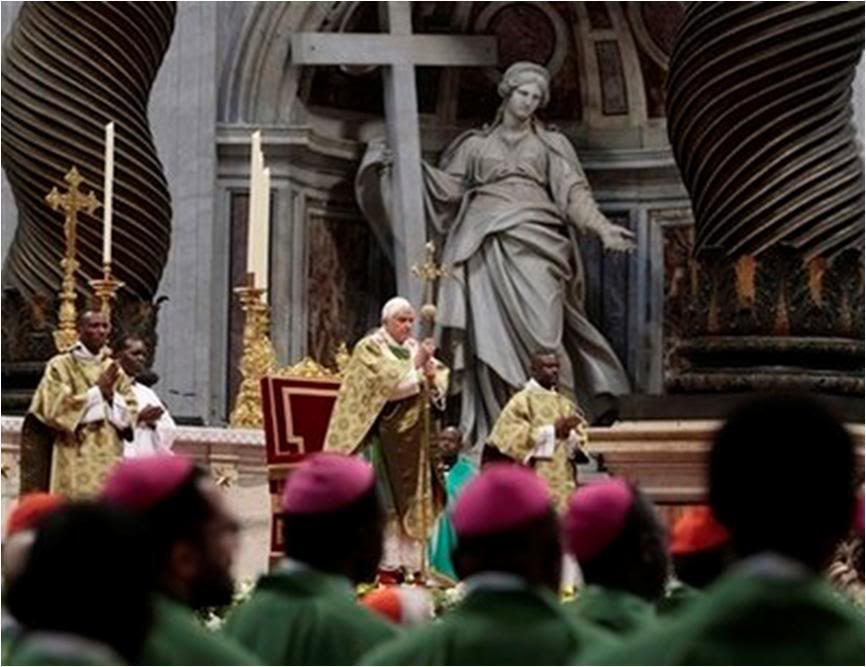
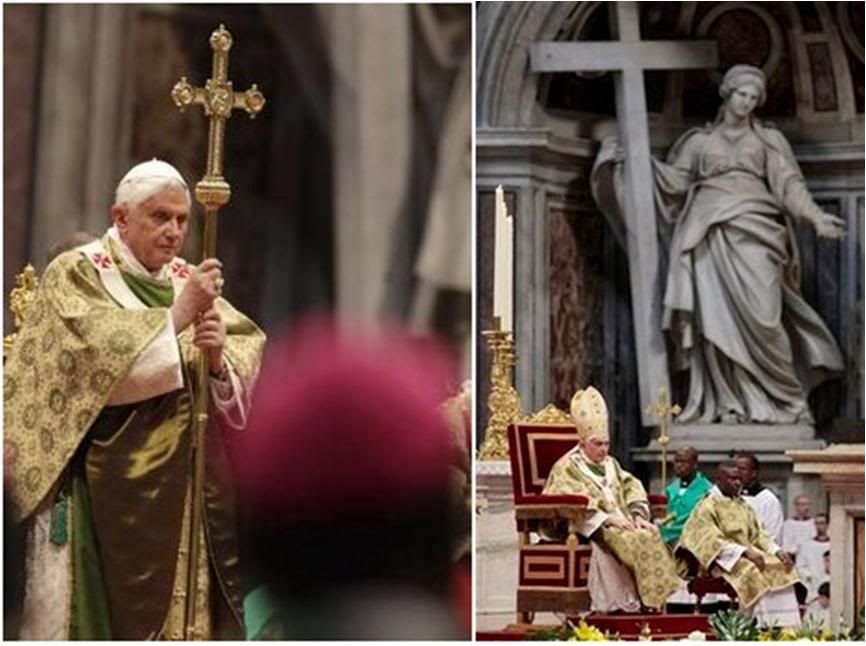
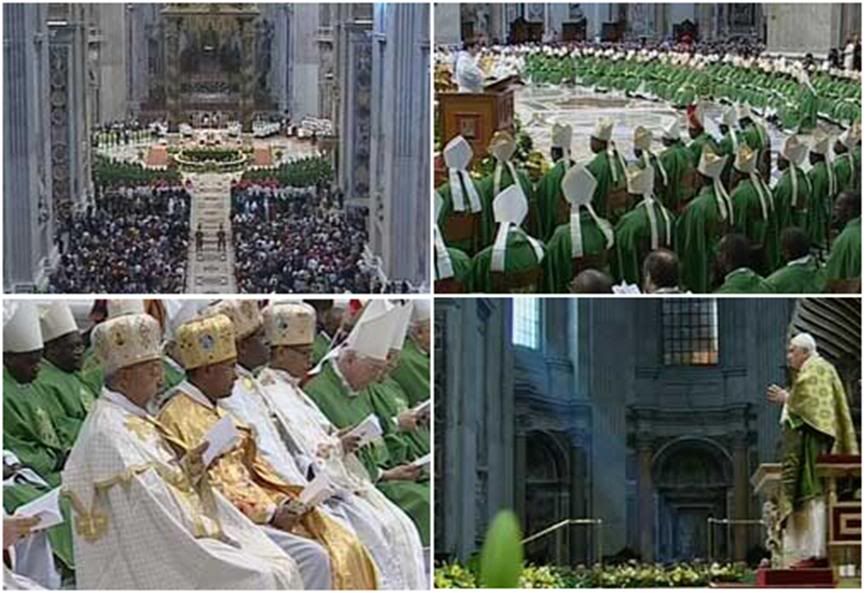
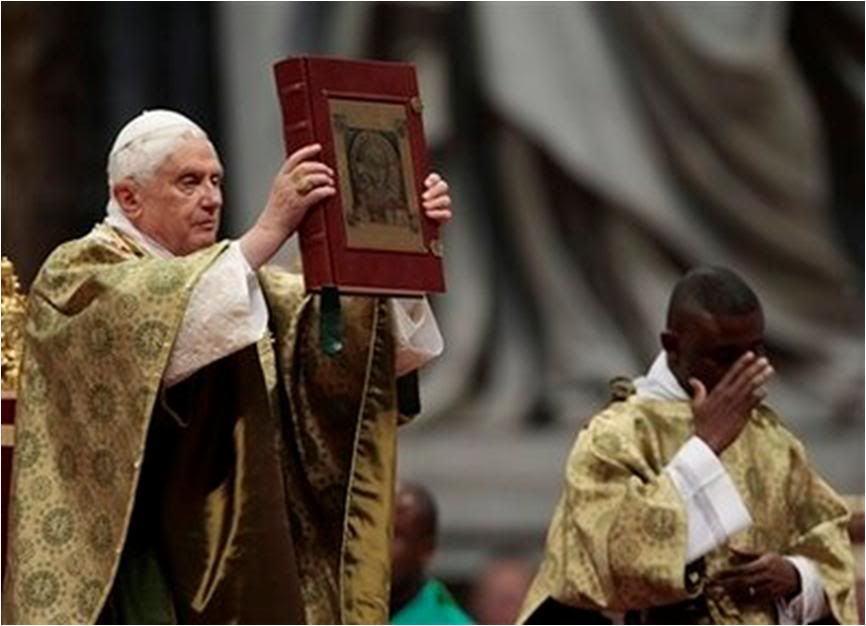 Here is a translation of the Holy Father's homily:
Here is a translation of the Holy Father's homily:
THE HOLY FATHER'S HOMILY
Venerated Brothers.
Dear brothers and sisters:
Here is a message of hope for Africa: We heard it just now in the
Word of God. It is the mesage that the Lord of history never tires of renewing for mankind oppressed and overcome in every age and on every land, since he revealed to Moses what he wished for the Israelites who were slaves in Egypt:
"I have witnessed the affliction of my people...and have heard their cry of complaint... I know well what they are suffering. Therefore I have come down to rescue them... and lead them out of that land into a good and spacious land, a land flowing with milk and honey" (Ex 3,7-8).
What is this land? Is it not perhaps the Kingdom of reconciliation, justice and peace, to which all of mankind is called? God's design does not change. It is the same that was prophesied by Jeremiah, in the magnificent oracles called 'The Book of Consolation', from which the first Reading today is taken.
It is an announcement of hope for the people of Israel, prostrated by the invasion of Nebuchadnezzar's army, by the devastation of Jerusalem and the Temple, and by the Babylonian exile.
It is a message of joy for the 'rest' of the sons of Jacob, which announces a future for them, because the Lord will lead them back to their land through a straight and convenient path.
Persons who are in need of support, like the blind and the lame, the mothers and those with child, will experience the strength and the tenderness of the Lord: he is a father for Israel, ready to care for it as for his firstborn (cfr Jer 31.7-9).
God's design does not change. Through the centuries and the upheavals of history, He aims at the same goal: the Kingdom of freedom and peace for all. This implies his favor for those who are deprived of freedom and peace, for those who are violated in their very dignity as human beings.
Let us think especially of our brothers and sisters in Africa who suffer poverty, disease, injustices, wars and violence, and enforced migrations. These sons beloved by the heavenly Father are like the blind man in the Gospel, Bar-Timaeus, who "sat by the roadside begging" (Mk 10,46) at the gates of Jericho, precisely where Jesus the Nazarene would pass.
It is the road that leads to Jerusalem, where he will spend the Pasch, his sacrificial Pasch, at which the Messiah will make his way to us. It is the road of his exodus which is also ours: the only way that leads to the land of reconciliation, justice and peace.
On that road, the Lord met Bar-Timaues, who has lost his sight. Their paths cross and become one. "Son of David, Jesus, have pity on me!", the blind man cries out trustingly. Jesus says, "Call him!", and adds: "What do you want me to do for you?"
God is light and the creator of light. Man is the child of light, made to see the light, but he has lost his sight, and finds himself forced to beg. The Lord passes by, he who who has made himself a beggar before us: thirsty for our faith and our love.
"What do you want me to do for you?". God knows, but he asks us - he wants man to speak. He wants man to get up on his feet, to recover the courage to ask for that which corresponds to his dignity. The Father wants to hear from his child the desire to see the light once more, the light for which he was created.
"Master, I want to see." And Jesus tells Bar-Timaeus: "'Go - your faith has saved you.' Immediately he received his sight and followed him on the way" (Mk 10,51-52).
Dear brothers, let us give thanks because this 'mysterious encounter btween our poverty and the greatness of God" took place even at the Synodal assembly for Africa which ends today.
God has renewed his call: "Take courage. get up" (Mk 10,49). And even the Church in Africa, through its pastors, who have come from all the nations of the continent, from Madaagascar and other islands, have received the message of hope and light to walk along the road that leads to the Kingdom of God.
"Go, your faith has saved you!" (Mk 10,52). Yes, faith in Jesus Christ - when it is well intended and practised - leads men and peoples to freedom in truth, or to use the three words of the Synodal theme, to reconciliation, justice and peace.
Bar-Timaeus, healed, who follows Jesus on his way, is the image of mankind who, illuminated by faith, sets forth towards the promised land. Bar-Timaeus becomes, in turn, a witness for the light, recounting and demonstrating in person that he has been healed, renewed, regenerated.
This is the Church in the world: a community of persons who are reconciled, who work for justice and peace: 'salt and light' in the midst of the societies of men and nations.
That is why the Synod has reaffirmed forcefully - and has shown - that the Church is the Family of God, in which there cannot be divisions on the basis of race, language or culture.
Moving testimonies have shown us that even in the darkest moments of human history, the Holy Spirit is at work and transforms the hearts of victims and persecutors so that they recognize themselves as brothers.
The reconciled Church is a powerful leaven for reconciliation in individual nations and in the whole African continent.
The second Reading offers us a further perspective: The Church, a community that follows Christ on the way of love, has a priestly form. The category of priesthood, as an interpretative key for the mystery of Christ, and consequently, of the Church, was introduced in the New Testatment by the author of the Letter to the Hebrews.
His intuition takes its source from Psalm 110, cited in today's passage, in which the Lord God, with solemn oath, assures the Messiah: "You are a priest forever according to the order of Melchizedek" (v. 4).
A reference that calls forth another, taken from Psalm 2, in which the Messiah announces the Lord's decree that says of him: "You are my Son: this day I have begotten you" (v. 7).
From these texts come the attribution to Jesus Christ of a priestly character, not in the generic sense, but 'according to the order of Melchizedek', that is to say, he is the supreme and eternal priest, not of human but of divine origin.
Though every high priest is "taken from among men and made their representative before God, to offer gifts and sacrifices for sins." (Heb 5,1), only He, Christ, Son of God, possesses a priesthood that is identified with his own person, a singular and transcendent priesthood on which universal salvationd epends.
Christ has transmitted his priesthood to the Church through the Holy Spirit. That is why the Church has in herself, in every one of her members, by virtue of Baptism, a priestly nature.
But - and this is a decisive aspect - the priesthood of Jesus Christ is no longer primarily ritual but existential. The dimension of rite is not abolished but, as it is clearly seen in the institution of the Eucharist, it takes its significance from the Paschal mystery, which brings to fulfillment the ancient sacrifices and surpasses them.
Thus are born at the same time a new sacrifice, a new priesthood, and even a new time - and all three coincide with the mystery of Jesus Christ. United to him through the Sacraments, the Church extends his saving action, allowing men to be healed through faith, like the blind Bar-Timaeus.
Thus the ecclesial community, following its Teacher and Lord, is called to decisively take the way of service, to share to the utmost the condition of the men and women in time, to bear witness of God's love to everyone, and thus, to sow hope.
Dear friends, the Church transmits this message of salvation, always conjugating evangelizaion and human promotion. Let us take, for example, the historic encyclical Populorum progressio: that which the Servant of God Paul VI elaborated in terms of reflection, missionaries have realized and continue to realize in the field, proomoting a development that respects local cultures and the environment, according to a logic that today, after more than 40 years, seems to be the only one that can help the African peoples emerge from the slavery of hunger and disease.
This means transmitting the announcement of hope according to a 'priestly form', meaning, by living the Gospel in person, seeking to translate it into projects and concrete actions that are consistent with the fundamental dymanic principle of love.
In these three weeks, the second special assembly for Africa of the Bishops' Synod has confirmed what my venerated predecessor John Paul II had already kindled very well, and which I wished to pursue in depth in the encyclical Caritas in veritate" namely, the model of global development must be renewed in a way that will "include all peoples and not only those who are adequately equipped" (No. 39).
What the social doctrine of the Church has always maintained, based on its vision of man and society, is asked today of globalization (cfr ibid.). This, one must recall, must not be understood fatalistically as though its dynamics were produced by anonymous impersonal forces and independent of human will.
Globalization is a human reality, and as such, it is modifiable according to one's cultural framework. The Church works with her personalist and communitarian concept in order to orient the process in terms of relatedness, brotherhood and sharing (cfr ibid., No. 42).
"Take courage, get up!" Thus the Lord of life and hope addresses the Church and the African populations at the end of these weeks of Synodal reflection.
Arise, Church of Africa, family of God, because the heavenly Father calls you, He whom your ancestors invoked as creator, even before knowing his merciful nearness, revealed in his only begotten Son, Jesus Christ.
Take the road of a new evangelization with the courage that comes from the Holy Spirit. This urgent evangelizing action, which was spoken about very much these days, also carries an urgent call to reconciliation, the indispensable condition in order to establish relationships of justice among men in Africa, and to construct an equitable and lasting peace respectful of every individual and every people. A peace that requires and is open to the contribution of all men of good will above and beyond their respective religious, ethnic, linguistic, cultural and social affiliations.
In this demanding mission, you - pilgrim Church in Africa of the third millennium - are not alone. The entire Catholic Church is close to you in prayer and in concrete solidarity, and from heaven, the African saints are with you, who with their lives, sometimes in martyrdom, bore witness of their full fidelity to Christ.
Take courage, and arise, African continent, land which welcomed the Savior of the world when as a baby he had to take refuge with Joseph and Mary in Egypt to keep him safe from the persecution of King Herod.
Welcome with renewed enthusiasm the announcement of the Gospel so that the face of Christ may illuminate with his splendor the multiplicity of cultures and languages of your peoples.
While it offers the bread of the Word and the Eucharist, the Church is also engaged in working with every means at its disposal, so that no African may lack his daily bread. And that is why, together with the frontline work of evangelization, Christians are active with interventions for human promotion.
Dear Synodal fathers, at the end of my reflections, I wish to address to you my most heartfelt greetings, to thank you for your edifying participation. Returning home, you, the pastors of the Church in Africa, carry my blessing to your communities. Convey to all the appeal that resounded often in this synod for reconciliation, justice and peace.
As this Synodal Assembly closes, I cannot but renew my sincere appreciation to the Secretary General of the Bishops' Synod and all his co-workers. And I express thanks to the choirs of the Nigerian community in Rome and of the Ethiopian College who are contributing to enliven this liturgy.
Finally, I wish to thank all those who have accompanied the work of the Synodal assembly with their prayers.
May the Virgin Mary reward each and everyone, and obtain for the Church in Africa that it may grow in every part of that great continent, spreading everywhere the 'salt' and the 'light' of the Gospel.
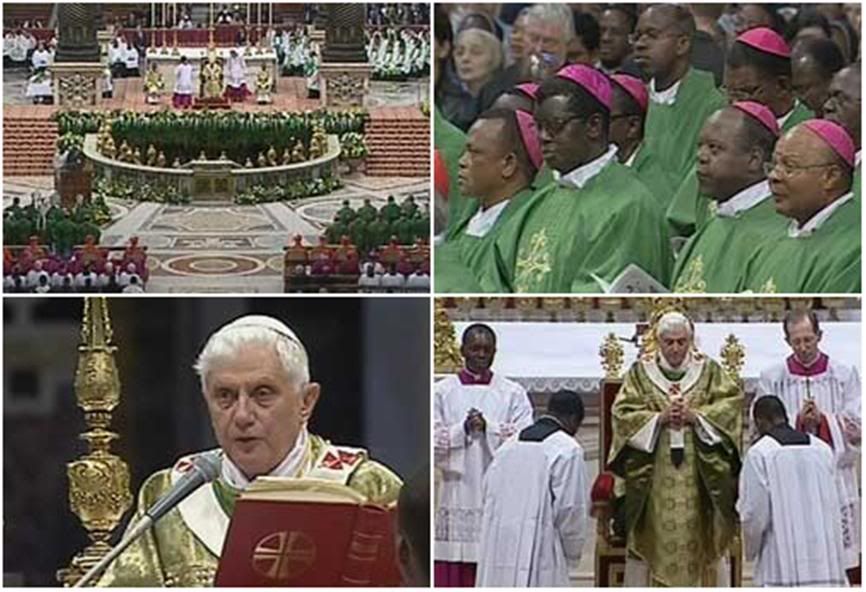
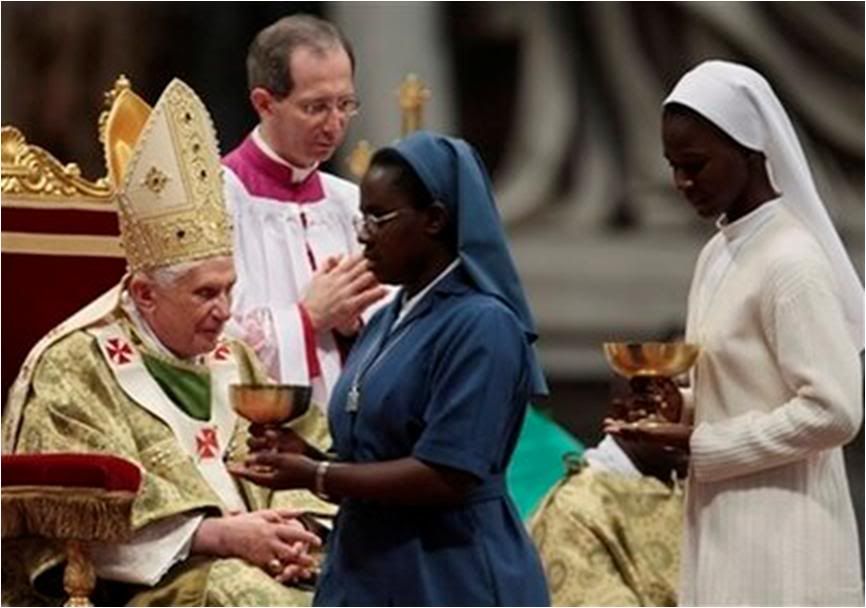 Pope celebrates Mass
Pope celebrates Mass
to cap Africa meeting
By ALESSANDRA RIZZO

VATICAN CITY, Oct. 25 (AP) – Pope Benedict XVI ended a three-week Vatican meeting on Africa Sunday with a call for peace and reconciliation among all people on the continent, regardless of ethnic and religious differences.
The Pope celebrated Mass in St. Peter's basilica to cap the meeting on the role of the Catholic Church in Africa.
"Courage! Get up, African continent!" Benedict said during the Mass, which he co-celebrated with some of the prelates who have attended the synod.
The Pope also said that globalization should be regulated in order to include all nations, not just developed ones.
Globalization, he said, is not governed by forces that are independent of the human will and can be adjusted by men. He added that the Catholic Church is working to promote development for all countries.
Benedict said that reconciliation is necessary to ensure a just peace in Africa, and called on all people to contribute regardless of ethnic, religious, language, cultural or social background. He praised the work of missionaries as one that is both respectful of the local cultures and essential to help Africa out of hunger and disease.
The two-hour ceremony, which featured traditional music, chants and prayers from Africa, formally closed the synod. Among those who co-celebrated the Mass was Cardinal Peter Turkson of Ghana, who was appointed Saturday to head the Vatican's justice and peace office.
The appointment was one of the most significant pieces of news to come out of the meeting, as it cements the cardinal's standing as a possible future papal candidate.
Turkson told reporters three weeks ago there was no reason there couldn't be a black Pope, particularly after Barack Obama was elected U.S. president.
During the meeting, the 300 bishops and cardinals looked at pressing issues such as AIDS and political corruption on the continent.
In their final message, the bishops told corrupt Catholic political leaders in Africa to repent or quit public office and stop wreaking havoc on their countries. In their final recommendations, the synod also called for starting religious dialogue with followers of Islam and African traditional religions.
Speaking to the faithful after the Mass, the Pope praised the "dynamism of the Christian communities, which keep growing in quantity and quality" in Africa.
While the Vatican has been concerned about the flagging faith of some Catholics in the affluent West, Church officials are heartened by the vibrancy of churches in parts of Africa and Asia.
In March, Benedict visited Cameroon and Angola, both of which have large Catholic populations.
[Modificato da TERESA BENEDETTA 25/10/2009 19:39] |
| |
 25/10/2009 13:28 25/10/2009 13:28 |
|
| | | OFFLINE | | Post: 18.712
Post: 1.360 | Registrato il: 28/08/2005
Registrato il: 20/01/2009 | Administratore | Utente Veteran | |
|
 The negative-impact title given to this Op-Ed piece has nothing to do with what the essay actually says. Which is a thoroughly secular commentary, by the way, from one of Britain's most successful contemporary novelists, who seems to passively accept the ultimate secularization of her native land.
The negative-impact title given to this Op-Ed piece has nothing to do with what the essay actually says. Which is a thoroughly secular commentary, by the way, from one of Britain's most successful contemporary novelists, who seems to passively accept the ultimate secularization of her native land.
'Rock of Ages cleft by the Pope' is either a deliberate distortion of the expression 'Rock of Ages' to make the Pope look bad, or a facile formulation by a headline writer who is not familiar with the expression, nor the 18th century British hymn it comes from. In this case, it seems to be used as a symbol for the Church of England, which is not at all what the hymn means.
The pastor who wrote the hymn was inspired by a gap in a rock where he sheltered during a storm, and he used it as a metaphor for Jesus Christ, pierced (cleft) by the lance, who dies for mankind, so the headline they chose to give this essay is absurd.
Rock of Ages,
cleft by the Pope
by A. N. Wilson
Op-Ed Contributor

Oct. 25, 2009
LONDON - The images and clichés came spluttering out of the laptops of church people and religious affairs correspondents on Tuesday: The Pope has parked his tanks on the Church of England’s lawn; Rome has made a hostile takeover bid for Canterbury.
It is understandable if people are at a loss for words, since the move has been made so decisively and so without warning. Even the Archbishop of Canterbury, Rowan Williams, knew nothing of the plan until a few days ago.
What has happened? Basically, it seems that Pope Benedict XVI has offered disgruntled Anglicans the opportunity to come over to Roman Catholicism en masse. Such an arrangement already exists in America.
Anglicans who dislike the way they see things going in their own church (female bishops, gay bishops, gay female bishops — take your pick) are allowed to regroup within the Church of Rome. Although their priests will need to be retrained and re-ordained, they will be able to continue to use their traditional rites and Prayer Books, and to stay together as congregations.
There is talk in England of as many as 1,000 clergy members taking this offer. Even allowing for the numerical exaggeration, which always occurs when enemies of liberalism congregate, this is a huge potential figure.
Let us say 500 Anglican priests and perhaps 10 bishops joined the new arrangement. Let us suppose they took with them plausible congregations. This would deliver a body blow not just to the Church of England, but to that whole intricately constructed and only semi-definable phenomenon, the British Establishment.
The numbers of practicing Catholics in England is greater than the number of practicing Anglicans. Within a generation, there will probably be more Muslims than practicing Anglicans in the British Isles.
Britain will no longer be able to endure the absurdity of the laws relating to the religion of the monarch, the Act of Settlement and Royal Marriages Act, which among other things forbid the sovereign to marry a Catholic. Or the Coronation Oath, which promises to uphold the Protestant religion.
Britain has gone through a truly prodigious change in the last 30 years. It has moved from being a largely white culture with Christianity as its background religion to being a completely secular, multicultural society.
The ease and good humor with which this revolution has occurred has made Britain — and especially London — an amazingly interesting place to be right now. A genial secularized liberalism is the new norm.
It might be difficult to define it, but you feel when its codes are infringed, as with the controversies over “faith schools” that teach creationism, or with the misgivings felt by many secular politicians about such issues as the wearing of the burqa.
The moderate right at present in power in France talks freely of dissuading women from wearing a body covering like the burqa because to do so is un-French.
In Britain, there is a much more tolerant attitude toward all faiths and none, with a great deal of rather likable muddle about where a decent liberal person should stand on such a matter. Maybe it’s just as British to wear a black bag over your head as to wear one of the bizarre outfits you still see in the enclosure at Royal Ascot.
In such a climate, the Church of England had no chance at all of surviving. It was bound to go, and it was just waiting, historically, for some catalyst to bring it to an end. That catalyst has been provided by the somewhat unlikely controversy over female bishops.
It is a strange breaking point, since there have been female priests for years. But conservative Anglicans object that other episcopal churches in the world — the Copts, Russian Orthodox, Roman Catholics — do not accept female bishops.
Anglicans have believed since the Reformation that although the Church of England had separated itself from Rome, it retained the historic episcopate, descended from Christ’s apostles. As a result, there are now Anglican bishops who, because they are women, are not recognized as bishops by all Anglicans, let alone the other apostolic churches.
As a result, England’s church has managed an “Alice in Wonderland” situation in which those who do not like female bishops (or the bishops who ordained them) can owe obedience to so-called Flying Bishops, upholders of the traditional faith who “fly” from parish to parish, regardless of the boundaries of diocese. These bishops, and others who think as they do, have been prime movers in shaping the Vatican’s new offer.
How will it all work? Will the English Catholics, always hard pressed for cash, be in a position to take over the running of our medieval churches? What will happen to the cathedrals? As fewer and fewer real Christians exist in England, will the church buildings be taken over by some secular conservation group like the National Trust? Probably.
And for the 55 million or so Britons who don’t regularly attend services — some 90 percent of the population — it is all rather unimportant.
But it is nevertheless a landmark. The Church of England has been the religious expression of that independent national identity which signaled the rise of Britain as a significant world power.
Hatched by Henry VIII and nurtured by his daughter Elizabeth I, the Church of England was an expression of that combination of tolerance and arrogance that marked the English governing class. It sat light to doctrine, and tried to accommodate many. But while that seemed a gentle thing to do, it did so because it actually laid claim to governing and controlling all.
Now, as the Pope looks to put an end to this facet of Britain’s character, there are ghosts smiling a little ruefully. For one, the Duchess of Windsor (a k a Wallis Warfield Simpson of Baltimore), denied the opportunity of being queen because the Church of England disapproved of divorce. The Catholic recusants, who huddled in priest-holes rather than acknowledge the monarch as supreme governor of the church, will be smiling a little grimly, too.
In time to come, I confidently predict, there will be others smiling ruefully, too — such as the “liberal” Anglicans left behind, who will watch a Pope (I guess 20 years from now) ordaining women to the Catholic priesthood. [ OH, you guess wrong, lady! You seem to think the Catholic Church takes changes to its millennial teaching and traditions as lightly as you British accommodate to the Muslims in your midst.]
Although it will be a sad day for those Anglicans who have reached a parting of the ways, for Britain itself, the Pope’s maneuver is actually good news. It will formally bring to an end the idea of the Established Church, and of the monarch as that Establishment’s symbol and head.
Whatever our private religious allegiances, we Britons no longer want to force our royal heads of state to jump through those impossible hoops. The paradox is that a move by a conservative Pope to ease the tender consciences ['Ease their consciences'? No, to respect their consciences, which The Church of England no longer does] of conservative-minded Anglicans will actually be a move toward the complete secularization of Britain, and an acceptance of its new multicultural identity.
|
| |
 25/10/2009 16:56 25/10/2009 16:56 |
|
| | | OFFLINE | | Post: 18.713
Post: 1.361 | Registrato il: 28/08/2005
Registrato il: 20/01/2009 | Administratore | Utente Veteran | |
|
 ANGELUS TODAY
ANGELUS TODAY
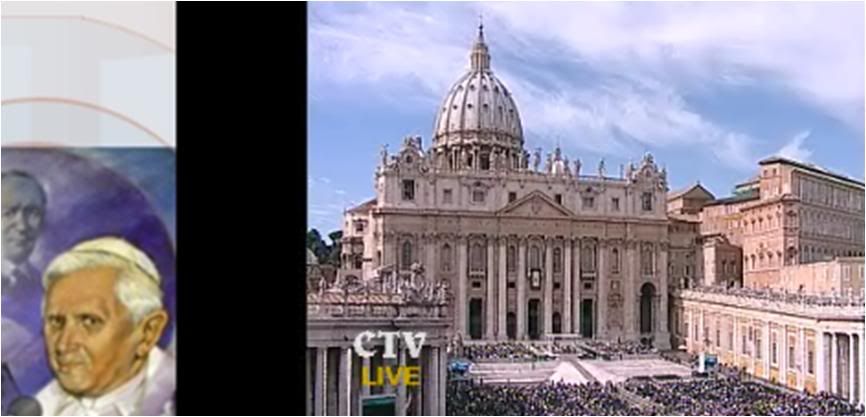
After the Mass this morning, the Holy Father cmae out to the front steps of St. Peter in order to lead the Sunday noon Angelus prayers.
This is what he said in English:
I am happy to greet all the English-speaking visitors present today in Saint Peter’s Square.
We have just concluded the Second Special Assembly for Africa of the Synod of Bishops which has been a period of grace. I invite all of you to pray for our brothers and sisters of Africa.
May the Lord, who granted sight to the blind man of the Gospel, renew their faith that they may always see and follow clearly the path of reconciliation, justice and peace which leads to salvation.
Upon all of you and upon all the people of Africa I invoke God’s abundant blessings.
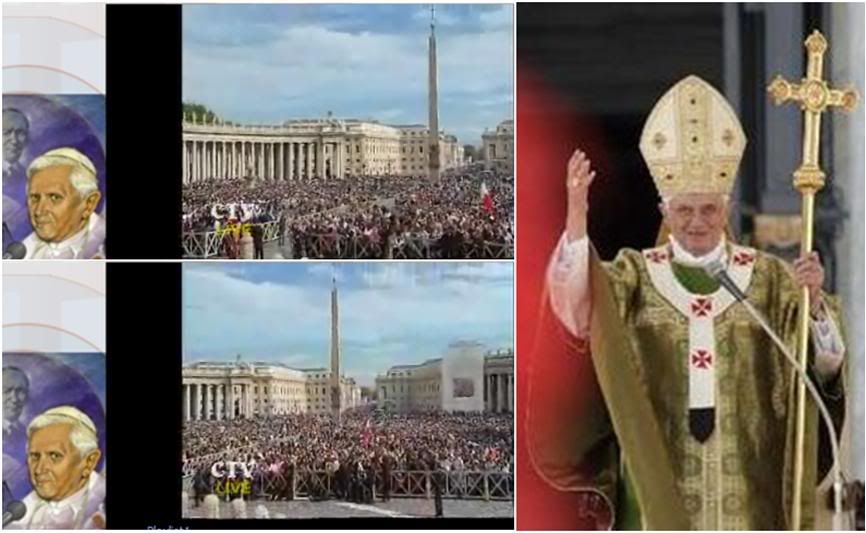
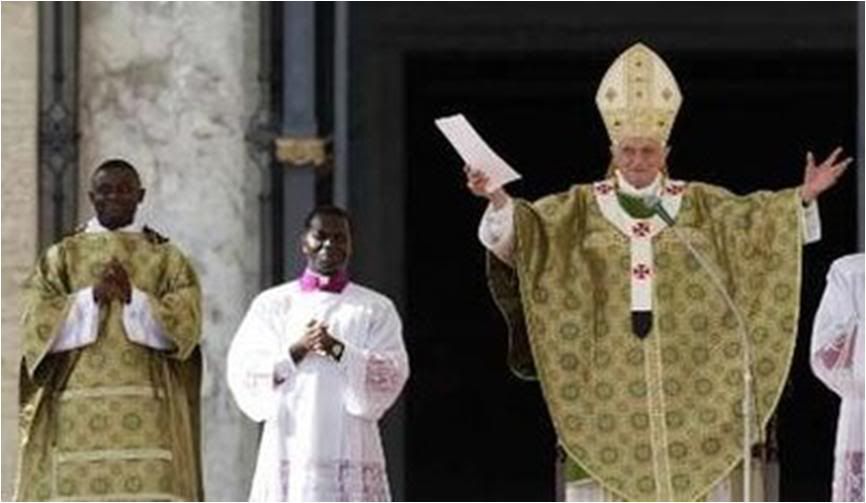 Here is a translation of the Holy Father's words:
Here is a translation of the Holy Father's words:
Dear brothers and sisters:
Just now, with the Eucharistic celebration in St. Peter's Basilica, we concluded the second special assembly for Africa of the Bishops' Synod.
Three weeks of prayer and listening to each other, to discern what the Holy Spirit is saying today to the Church on the African continent, but also to the universal Church.
The Synodal fathers, coming from all the nations of Africa, presented the rich reality of their local Churches. Together, we shared their joy at the dynamism of their Christian communities who continue to grow in quntity and quality.
We are grateful to God for the missionary impulse which has found fertile ground in numerous dioceses and which is expressed in sending missionaries to other African nations and other continents.
Particular attention was given to the family, which even in Africa, constitutes the primary cell of society, but which is threatened today by ideological currents coming from the outside world.
What can we say about the young people expposed to this kind of pressure, who are influenced by models of thought and behavior which are opposed to the human and Christian values of the African peoples?
Of course, the actual problems of Africa today emerged at the Synodal assembly, along with its great need for reconciliation, justice and peace. And to this, the Church responds, with a renewed thrust in its announcement of the Gospel and its activity of human promotion.
Inspired by the Word of God and the Eucharist, she is doing all she can so that no one may lack what is necessary to live, and that all may be able to lead an existence worthy of the human being.
Recalling the apostolic trip that I made to Cameroon and Angola last March, and which also had the purpose of starting off the immediate preparation for the second Synod for Africa, today I wish to address all the African populations, particularly those who share the Christian faith, in order to hand down to them ideally the final message of this Synodal assembly.
It is a message coming from Rome, seat of the Successor of Peter, who presides over the universal communion, but we can say, in a sense that is no less true, that it originated in Africa, from which it gathered experiences, expectations and plans, and now returns to Africa, carrying the riches of an event of profound communion in the Holy Spirit.
Dear brothers and sisters who are listening to me in Africa, I specially entrust to your prayers the fruits of the work of the Synodal fathers, and I encourage you with the words of the Lord Jesus: Be salt and light in the beloved land of Africa.
As this Synodal assembly ends, I wish to remind you that a special assembly for the Middle East of the Bishops' Synod is scheduled to take place next year. On the occasion of my visit to Cyprus, I will have the pleasure of presenting the Instrumentum laboris for that assembly.
Let us thank the Lord who never tires of edifying his Church in communion, and let us invoke with trust the maternal intercession of the Virgin Mary.
After the Agnelus prayers, he had this special message:
I now address a special greeting to the thousands of faithful gathered in Milan's Cathedral Square, where this morning, the liturgy of beatification was celebrated for the priest Don Carlo Gnocchi.
He was first of all a worthy educator of children and youth. During the Second World War, he became the chaplain of the Alpine guard, with whom he made the tragic retreat from Russia, escaping death miraculously.
It was then that he planned to dedicate himself entirely to work of charity. Thus, in the Milan of the reconstruction period, Don Gnocchi worked 'to restore the human person', gathering together orphaned and mutilated children, offering them assistance and education.
He gave his all to the very end, and when he died, he donated his corneas to two blind children. His work continues to develop through the Fondazione Don Gnocchi which is in the forefront of care for persons of all ages who require rehablitation therapy.
As I greet Cardinal Tettamanzi, Archbishop of Milan, and rejoice with the entire Ambrosian Church, I make mine the motto of this beatification, "Always for life!"
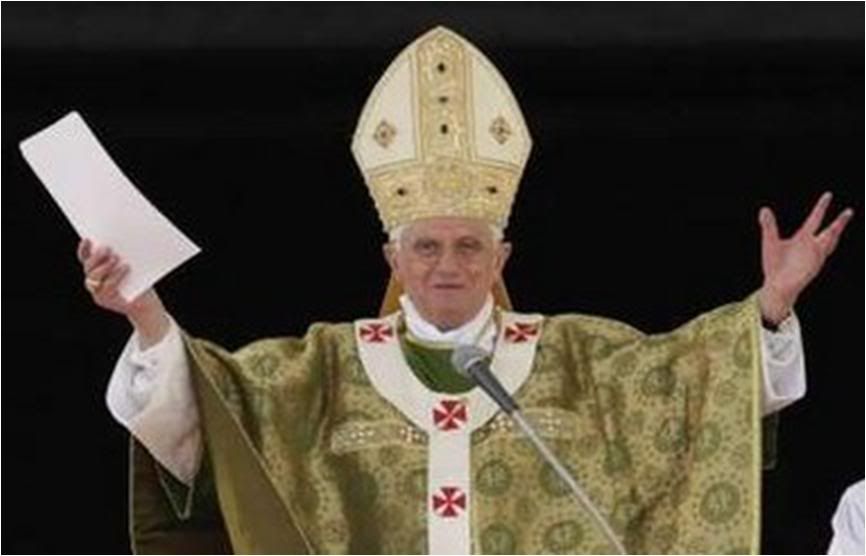
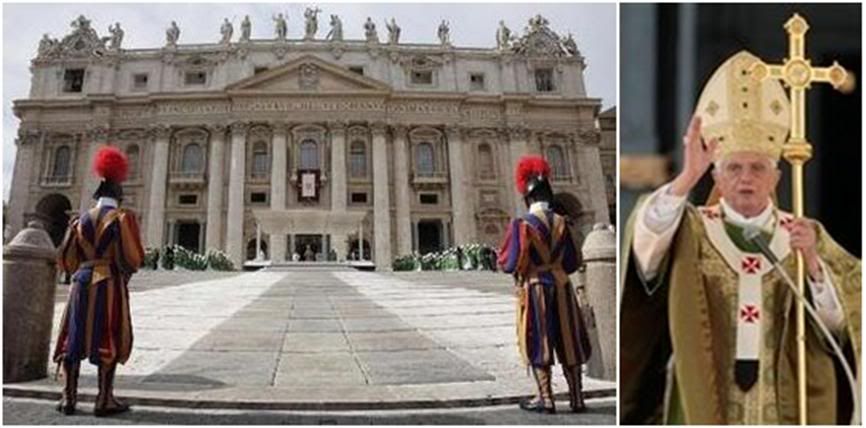
[Modificato da TERESA BENEDETTA 25/10/2009 17:42] |
| |
 26/10/2009 01:39 26/10/2009 01:39 |
|
| | | OFFLINE | | Post: 18.717
Post: 1.365 | Registrato il: 28/08/2005
Registrato il: 20/01/2009 | Administratore | Utente Veteran | |
|
 Senior Anglican bishop reveals
Senior Anglican bishop reveals
he is ready to convert to Roman Catholicism:
Move could spark exodus of clergy
By Jonathan Wynne-Jones
Religious Affairs Correspondent

Oct. 24, 2009
The Rt Rev John Hind, the Bishop of Chichester, has announced he is considering becoming a Roman Catholic in a move that could spark an exodus of clergy
Hundreds of traditionalist clergy could join the exodus, though most are waiting for the exact details of the new apostolic constitution to be published.
Bishop Hind said he would be "happy" to be reordained as a Catholic priest and said that divisions in Anglicanism could make it impossible to stay in the church.
He is the most senior Anglican to admit that he is prepared to accept the offer from the Pope, who shocked the Church of England last week when he paved the way for clergy to convert to Catholicism in large numbers.
In a further blow to the Archbishop of Canterbury's hopes of preventing the Anglican Communion from disintegrating, other bishops have cast doubt over its survival.
The Rt Rev John Broadhurst, the Bishop of Fulham, even claimed that "the Anglican experiment is over". He said it has been shown to be powerless to cope with the crises over gays and women bishops.
In one of the most significant developments since the Reformation, the Pope last week announced that a new structure would be set up to allow disaffected Anglicans to enter full communion with Rome, while maintaining parts of their Protestant heritage.
The move comes after secret talks between the Vatican and a group of senior Anglican bishops. Dr Rowan Williams, the Archbishop of Canterbury, was not informed of the meetings and his advisers even denied that they had taken place when the Sunday Telegraph broke the story last year.
Now Bishop Hind, the most senior traditionalist in the Church of England, has confirmed that he is willing to sacrifice his salary and palace residence to defect to the Catholic Church.
"This is a remarkable new step from the Vatican," he said. "At long last there are some choices for Catholics in the Church of England. I'd be happy to be reordained into the Catholic Church."
While the bishop stressed that this would depend on his previous ministry being recognised, he said that the divisions in the Anglican Communion could make it impossible to stay.
"How can the Church exist if bishops are not in full communion with each other," he said.
Conservative archbishops and bishops have broken ties with their liberal counterparts following the US Episcopal Church's consecration of Gene Robinson, the first openly gay bishop.
Bishop Broadhurst said that the Pope has made his offer in response to the pleas of Anglicans who despair at the disintegration of their Church.
" Anglicanism has become a joke because it has singularly failed to deal with any of its contentious issues," said the bishop, who is chairman of Forward in Faith, the Anglo-Catholic network that represents around 1,000 traditionalist priests.
"There is widespread dissent across the [Anglican] Communion. We are divided in major ways on major issues and the Communion has unravelled.
"I believed in the Church I joined, but it has been revealed to have no doctrine of its own.
"I personally think it has gone past the point of no return. The Anglican experiment is over."
The Rt Rev Martyn Jarrett, the Bishop of Beverley, also said there were questions over the church's survival, adding that the Church of England has changed too dramatically for some traditionalists.
"They are beginning to reflect that the theological position of the Church isn't what they believe," he said.
"The offer from the Vatican is momentous and I felt a great sense of gratitude that the Roman Catholic Church is thinking about the position of traditionalist Anglicans."
Clergy at the Forward in Faith conference, which met in Westminster yesterday, expressed relief that the Pope had provided them with an escape route.
Fr Ed Tomlinson, vicar of St Barnabas, Tunbridge Wells, said that he would be following the lead of Bishop Hind.
"The ship of Anglicanism seems to be going down," he said. "We should be grateful that a lifeboat has been sent.
"I shall be seeking to move to Rome. To stay in the Church of England would be suicide."
Hundreds of traditionalist clergy could join the exodus, though most are waiting for the exact details of the new apostolic constitution to be published.
Battles lie ahead over whether priests who leave to join the Catholic Church will be allowed to take their churches with them, but some bishops have already warned against property seizure.
Dr Williams was only informed of the details of the Pope's decree last weekend and is understood to have been "implacably opposed" to the move.
Lord Carey, the former Archbishop of Canterbury, said he was "appalled" that his successor was given such short notice and was excluded from discussions on the issue.
The Rt Rev Gregory Cameron, Bishop of St Asaph and a close colleague of Dr Williams, said that the archbishop was likely to be saddened by the developments.
"Rowan has worked very hard for unity both within the Anglican Communion, and with Rome, and I suspect he may feel that what has happened is little short of a betrayal, not by the Catholic Church, but by some of those in his own ranks."
"He is likely to be saddened that they felt driven to seek such a radical solution and that some of them now feel they have to go."
"Up until now, the Roman Catholic Church has been putting its weight behind Rowan, but now it is appearing to put its weight behind the conservative groups it can most easily win over."
"The danger is that they'll have every disaffected Anglican beating down the pathway to their door and asking for special treatment."
The Sunday Telegraph can disclose that the planning behind last week's announcement began in 2006, when the Pope asked the Congregation for the Doctrine of the Faith to consider how they could invite Anglicans into the Roman Catholic fold.
He had reached out to disillusioned Anglicans three years earlier, when as head of the Congregation, the most powerful of the Vatican's departments and successor to the medieval Inquisition, he wrote a personal letter to Anglicans in America. He reassured them of the Catholic Church's support of their stand against the liberal tide.
Ranking Anglican bishop
open to turning Catholic

Oct. 26, 2009
Dr Michael Nazir-Ali, the former Bishop of Rochester, has refused to rule out converting to the Roman Catholic church.
If he did it would be one of the most high-profile conversions to come of Pope Benedict XVI's move to allow disaffected Anglicans full union with Rome.
Dr Nazir-Ali, who retired as the Bishop of Rochester in September, said: "I won't rule it out or rule it in. I wait with interest to see that the details of the offer are."
He was speaking over the weekend at a London conference of 500 traditionalists, who were welcoming the Pope's surprising initiative.
They voted in favour of consulting parishes on whether or not to split from the Church of England to join the Catholic church, but decided they could not act further until details of the Apostolic Constitution were published.
Worldwide up to 400,000 Anglicans, upset with the ordination of women bishops and homosexual clergy, could convert to the Catholic church.
The following commentary is much too harsh with Archbishop Williams, who is hapless enough, but is right on about the fundamentals of the situation - and properly appreciates Benedict's bold end-run (the equivalent of a nuclear option) around the professional ecumenists. Warner is also a very expressive and literate writer.
Vatican's first strike
has left Anglicans
dazed and confused
By Gerald Warner

Oct. 25, 2009
This was the Church of England's Pearl Harbour. A bruised and dazed Archbishop Rowan Williams was pulled from the rubble of Henry VIII's bombed-out edifice to take part in a joint Anglican-Catholic news conference last Tuesday, announcing Pope Benedict XVI's imminent Apostolic Constitution offering special provisions for Anglican converts to Rome.
Seated beside his captor, Archbishop Nichols of Westminster, Williams looked like a downed spy-plane pilot being paraded before the world press in Cold War Moscow.
If you are wondering why the Archbishop of Canterbury should be taking part in the promotion of an offer designed to tempt members of his flock to defect, that is simply a reflection of the confusion generated by "ecumenical dialogue".
For face-saving reasons, Williams tried desperately to pretend that this Vatican initiative was the outcome of mutual consultation, when the reality was that he had wakened up that morning to find Ratzinger's tanks on his lawn.
Only the previous day had Cardinal Levada, Prefect of the Congregation for the Doctrine of the Faith (CDF), arrived at Lambeth Palace to brief Williams on the fait accompli. Williams admitted as much in a letter to the bishops of the Anglican communion in which he wrote: "I am sorry that there has been no opportunity to alert you earlier to this; I was informed of the planned announcement at a very late stage…"
At the Roman end, the buzz is that Cardinal Kasper, the official ecumenical pass-seller, had been kept in ignorance almost as long. The notoriously liberal Catholic bishops of England and Wales are similarly believed to have had a minimalist profile in this exercise. The leading role was played by the CDF, under the supervision of the Pope. This was Blitzkrieg. Word on the street is B16 is kicking butt.
The text of the Apostolic Constitution will not be published for almost two weeks, but it proposes a canonical structure for receiving groups of Anglicans into the Catholic Church while allowing them the local jurisdiction of a "Personal Ordinariate", under which they would be permitted to preserve "elements of the distinctive Anglican spiritual and liturgical patrimony". The presiding "Ordinaries" would usually be former Anglican clergy.
Married Anglican clergy could be ordained as Catholic priests, which has happened with some converts, but not married laymen, so no challenge is posed to the discipline of clerical celibacy.
This is not a leap in the dark: a similar arrangement has been piloted among Episcopalian converts in America, where it has worked well. As the constitution will embrace the entire Anglican communion, it is also applicable to the Scottish Episcopal Church.
After 40 years of phoney ecumenical dialogue, Benedict XVI has finally cut the Gordian knot. Since 1970, the ecumenical circus has been run by the Anglican-Roman Catholic International Commission (ARCIC), with spectacular lack of success.
In this dialogue of the deaf, "liberals" from both sides indulged in dishonest wordplay, with Catholic appeasers trying to disown more and more of their faith, while Anglicanism ran ever faster in the opposite direction.
While press releases spouted ecumaniac drivel, the Anglicans voted to ordain priestesses in 1992. In 2003 John Paul II suspended talks, following the consecration of the homosexual American bishop Gene Robinson. The Church of England is now moving inexorably to the consecration of women "bishops".
Only a clutch of flared-trousered 1960s relics still dance arthritically to the ecumenical tune. Now Rowan Williams and Walter Kasper have been left to dance around their handbags.
What else did they expect? Was Rome supposed to hang on until the consecration of the first openly alien-abductee Anglican bishop? The Church of England is a nasty car crash. Benedict XVI is inviting believers to crawl out of the wreckage and come home to Rome.
His ecumenical priority is to do what should have been done decades ago and start serious discussions with the orthodox, instead of the time-wasters in a clapped-out remnant of the Tudor civil service. Too much time has been lost in the ARCIC wastes.
Tomorrow, the first round of talks opens between the Vatican and the Society of St Pius X. Having made provision for Anglicans, the Pope can now offer the SSPX a Prelature status, on the model of Opus Dei.
Recognising that many Church institutions are unfit for the purpose or manned by liberal obstructers, it is becoming evident that the Pope is increasingly bypassing them and pursuing his objectives with the help of trusted aides. This is a potentially forceful form of governance – as his first-strike nuclear offensive against the Church of England last week demonstrated.
In contrast, two weekend essays by a couple of American writers who have some reputation for their 'religious' output, are far less persuasive and present some flawed arguments.
Benedict’s gambit
by ROSS DOUTHAT
Op-Ed column

Published: October 25, 2009
The Church of England has survived the Spanish Armada, the English Civil War and Elton John performing “Candle in the Wind” at Princess Diana’s Westminster Abbey funeral.
So it will probably survive the note the Vatican issued last week, inviting disaffected Anglicans to head Romeward, and offering them an Anglo-Catholic mansion within the walls of the Roman Catholic faith.
But the invitation is a bombshell nonetheless. Pope Benedict XVI’s outreach to Anglicans may produce only a few conversions; it may produce a few million.
Either way, it represents an unusual effort at targeted proselytism, remarkable both for its concessions to potential converts — married priests, a self-contained institutional structure, an Anglican rite — and for its indifference to the wishes of the Church of England’s leadership.
[Of course, I strongly disagree with the use of the term 'proselytism' which implies active campaigning to get converts in. No objective observer - indeed, not even the Church of England itself - questions that the Holy Father's decision was other than a response to persistent solicitation - some English writers use the term 'lobbying' - by traditionalist Anglican bishops seeking an accommodation with and in the Roman Catholic Church. It doesn't help when the Pope gets friendly fire like Douthat's mistaken use of the term.]
This is not the way well-mannered modern churches are supposed to behave. Spurred by the optimism of the early 1960s, the major denominations of Western Christendom have spent half a century being exquisitely polite to one another, setting aside a history of strife in the name of greater Christian unity.
This ecumenical era has borne real theological fruit, especially on issues that divided Catholics and Protestants during the Reformation. [That's rathere rash. Please enumerate! I can think of only two - the document on justification with the Lutherans, and an agreement about the role of the Virgin Mary, with the Anglicans.]
But what began as a daring experiment has decayed into bureaucratized complacency — a dull round of interdenominational statements on global warming and Third World debt, only tenuously connected to the Gospel.
[A rather simplistic reduction of the state of ecumenical dialog (which, by the way, was never intended to be simply an experiment). It is afflicted not so much with complacency, as by becoming focused on the process rather than the goal.
And I'm surprised Douthat seems to ignore the pragmatic purpose of ecumenical dialog - which is to galvanize concrete action on practical issues that all sides can support - inasmuch as theological dialog may quite literally go on till Kingdom come! Global warming and Third World debt are certainly not 'tenuously connected' to the Gospel. Positive action in both areas embody Gospel principles - one, of responsibility for God's creation, and the other, love of neigbor demonstrated by equitable justice towards poorer and weaker communities.]
At the same time, the more ecumenically minded denominations have lost believers to more assertive faiths — Pentecostalism, Evangelicalism, Mormonism and even Islam — or seen them drift into agnosticism and apathy.
Nobody is more aware of this erosion than Benedict. So the Pope is going back to basics — touting the particular witness of Catholicism even when he’s addressing universal subjects, and seeking converts more than common ground.
[I don't think the Church, much less Benedict XVI, has ever confused. much less conflated, ecumenism with evangelization!
Along the way, he’s courting both ends of the theological spectrum. In his encyclicals, Benedict has addressed a range of issues — social justice, environmental protection, even erotic love — that are close to the hearts of secular liberals and lukewarm, progressive-minded Christians. [But he does not make statements about social issues because he is trying to 'court both ends of the ideological specturm' - he's saying what needs to be said about such issues from the Catholic point of view!]
But instead of stopping at a place of broad agreement, he has pushed further, trying to persuade his more liberal readers that many of their beliefs actually depend on the West’s Catholic heritage, and make sense only when grounded in a serious religious faith. [That's fuzzy! Especially since the social positions liberals most care about - those that do not respect the defense of life, the family and the institution of marriage - certainly do not 'depend on the West's Catholic heritage'!]
At the same time, the Pope has systematically lowered the barriers for conservative Christians hovering on the threshold of the church, unsure whether to slip inside. This was the purpose behind his controversial outreach to schismatic Latin Mass Catholics, and it explains the current opening to Anglicans.
['Lower the barriers' is an inappropriate expression for what the Pope is doing. He is not so much 'lowering' any barriers - or standards for that matter - but opening doors, for which there is an admission price: Everyone who enters must profess the essentials of the Catholic faith, respect the Tradition and follow the Magisterium of the Church.
It's no free pass, whether it's the Lefebvrians or the traditional Anglicans who have been knocking at the door - whose strongest suit is that the doctrine they profess and their liturgical practices are already 'more Catholic' than the beliefs and practices of cafeteria Catholics!
It stands to reason that the forthcoming Apostolic Constitution is primarily intended for such Anglicans, not those whose beliefs and practices are closer to evangelical Protestantism, who would have no interest in turning Catholic anyway!]
Many Anglicans will never become Catholic; their theology is too evangelical, their suspicion of papal authority too ingrained, their objections to the veneration of the Virgin Mary too deeply felt. But for those who could, Benedict is trying to make reunion with Rome a flesh-and-blood possibility, rather than a matter for academic conversation.
The news media have portrayed this rightward outreach largely through the lens of culture-war politics — as an attempt to consolidate, inside the Catholic tent, anyone who joins the Vatican in rejecting female priests and gay marriage.
But in making the opening to Anglicanism, Benedict also may have a deeper conflict in mind — not the parochial Western struggle between conservative and liberal believers, but Christianity’s global encounter with a resurgent Islam.
Here Catholicism and Anglicanism share two fronts. In Europe, both are weakened players, caught between a secular majority and an expanding Muslim population. In Africa, increasingly the real heart of the Anglican Communion, both are facing an entrenched Islamic presence across a fault line running from Nigeria to Sudan.
Where the European encounter is concerned, Pope Benedict has opted for public confrontation. In a controversial 2006 address in Regensburg, Germany, he explicitly challenged Islam’s compatibility with the Western way of reason — and sparked, as if in vindication of his point, a wave of Muslim riots around the world.
By contrast, the Church of England’s leadership has opted for conciliation (some would say appeasement), with the Archbishop of Canterbury going so far as to speculate about the inevitability of some kind of sharia law in Britain.
There are an awful lot of Anglicans, in England and Africa alike, who would prefer a leader who takes Benedict’s approach to the Islamic challenge. Now they can have one, if they want him.
This could be the real significance of last week’s invitation. What’s being interpreted, for now, as an intra-Christian skirmish may eventually be remembered as the first step toward a united Anglican-Catholic front — not against liberalism or atheism, but against Christianity’s most enduring and impressive foe.
[It's difficult to share Douthat's rather tenuous speculation. It's an interesting thought, but I doubt that the anti-Islam factor had anything to do with the Pope's pastoral decision. Surely, Benedict XVI does not want new Catholics unless their primary motivation is to profess and practice a faith they truly believe in, and not only as a matter of convenience. Besides, determined Christians of any denomination can stand together against Islam - they don't have to convert to Catholicism for that.]
I do not trust David Gibson at all when it comes to his treatment of Benedict XVI, and I have never been able to follow the peculiar meanderings of his perverse reasoning - though I suspect he does it to call attention, as he does in this piece, in which he deliberately uses an absurd and fallacious hypothesis that could seem 'provocative' to anyone who's interested.
My problem with this article is worse, however. On many important points, Gibson expresses opinion that is distinctly uninformed - one would think he would check out some basic facts before rashly committing himself in writing. Just because he wrote a dubious 'biography' of Benedict XVI does not automatically make him an expert on religion, but he is being treated as such by editors who don't know any better.
Is Pope Benedict a closet liberal?
By David Gibson

Sunday, October 25, 2009
When Cardinal Joseph Ratzinger was elected Pope in April 2005, all the world rejoiced -- or recoiled -- with the certain knowledge that the cardinals had settled on the one man who would be more conservative than John Paul II.
For those who weren't so enthused about the Holy Spirit's selection, there was grim consolation in the fact that Ratzinger, now Benedict XVI, was 78 years old and was himself predicting a brief papacy that would serve as a transition to whatever came next.
Some transition. In less than five years Benedict has shown himself to be quietly yet deliberately engaged in re shaping Catholicism. Even more surprising are the remarkably liberal means he has used to achieve his ends -- means that could lead to places the Pontiff may not intend to go.
[You under-estimate Joseph Ratzinger if you think he has not thought all his moves through like a chess grand master. We see now he leaves the routine business-as-usual 'governance' of the Vatican to people like Cardinal Bertone, but it's not just so he can write what he must write, but so he can move his chess pieces with leisurely consideration in what Gibson calls 'reshaping Catholicism', which is really Benedict XVI's way of bringing the Church and Catholics back to the unencumbered essentials of the faith.
And he apparently keeps his moves close to his chest, involving persons he trusts in his strategies on a strictly need-to-know basis. He's seen too much at the Vatican to trust its bureaucracy in the really important matters.]
A case in point is last week's stunning announcement (it took even the leader of the worldwide Anglican Communion, Rowan Williams, the archbishop of Canterbury, by surprise) that the Pope is creating a novel "church within a church" so that Anglicans can join with Catholics without giving up their rites and traditions. [Until we have seen the Apostolic Constitution, using the term 'church within a church' is jumping the gun.]
The goal is to accommodate traditionalist Anglicans around the globe and conservative Episcopalians in the United States who are upset about the acceptance of openly gay clergy in North America and female bishops in the Church of England, and with what they see as the failure of their leadership to discipline the transgressors.
[Gibson misses the point: their objection to women and gay priests is just one expression of their traditional Christianity which reaches back to the teachings and practices of the undivided Church (of which only the Roman Catholic Church remains the custodian)! Those who merely object to these liberal 'innovations' but do not subscribe to traditional Christian doctrine are not likely to be attracted by the Vatican initiative.]
Under Benedict's unprecedented arrangement, bishops and whole dioceses and parishes could go Roman, and married clergy could bring their wives along and remain priests. [Not unprecedented - it has been done successfully with a few Episcopal communities in the US! I suppose we may call them pilot communities now.]
Cardinal William Levada, head of the Congregation for the Doctrine of the Faith -- and Rome's point man in the secret negotiations with disaffected Anglicans that preceded the move -- said 20 to 30 Anglican bishops have asked the Vatican about joining up.
But much uncertainty remains, for both Anglicans and Catholics.
[Of course, much uncertainty remains. I find this banal observation remarkably stupid. Only the intention has been announced so far, and some features that resemble those that have already been tried out in the pilot communities. Even after the Apostolic Constitution is published, tehre will be dozens of questions raised. Look at the simple Motu Proprio that Summorum Pontificum was - and how many unresolved questions remain to this day.
Some Anglican bishops have been lobbying for this, some claiming to bring their entire communities in tow. Now the Pope has given them a way to do it. It's still up to them, individually and collectively, to decide whether they can accept his terms.
The Vatican has certainly not projected publicly how many it expects to take the offer. Cardinal Levada limited himself to saying 'Maybe 30 bishops or so". For the Church, it is not a numbers game - the offer is out there - whether only a handful avail of it, or hundreds of thousands.]
As Father Thomas Reese of the Woodstock Theological Center in Washington has pointed out, allowing a separate Anglican rite in the Catholic Church -- complete with married priests and seminarians, new hymnals and good music (finally, many Catholics might say!) -- could alter Catholic views on celibacy and liturgy as much as it changes the Anglican Communion.
[Again, the speculations are getting far ahead of what is known so far. Does Fr. Reese really think these questions have not been considered by the Pope? It is just as conceivable that the Apostolic Constitution will have a statute of limitations that will limit the married clergy allowability only to those who join within a certain period of time, and that as time passes and the new Catholics are assimilated , Anglican seminaries will stop accepting married applicants, and eventually, the Anglo-Catholic clergy will observe celibacy just like regular Catholic clergy do. Why should it be assumed that the newcomers, who will be a decided minority, will prevail over the faithful adherents and practitioners of priestly celibacy in the universal Church's 400,000-strong clergy today?]
What this move confirms, however, is that change is the paradoxical mantra of Benedict's papacy. In another development last week, one that drew far less notice but could have a profound impact, the Vatican opened a dialogue with the leadership of a traditionalist, right-wing sect that split with Rome in 1988 over what its members saw as dangerous and even heretical trends resulting from the reforms of the Second Vatican Council in the 1960s.
Among other things, Vatican II affirmed the principle of religious liberty, launched dialogue with other churches and religions, expanded the role of lay Catholics and promoted liturgical changes that overhauled the Mass for the first time since the counter-Reformation Council of Trent in the 16th century.
Many observers say a rapprochement could require Benedict to make compromises on some of those issues, which could further encourage a critical reinterpretation of the Second Vatican Council and its modernizing reforms.
[There is that objectionable word again. The Church never compromises on principles. Mons. Fellay himself is clear about this: "We are not looking for compromises - we seek clarification". One imagines Benedict XVI welcomes these doctrinal talks with the FSSPX because he is aware of the ambiguities in the Council documents as well as the deliberate distortions and misinterpretations that the progressivists have worked on them - and this appears to be a God-given opportunity to make these clarifications once and for all.]
In 1988, under the direction of then-Cardinal Ratzinger, the Vatican had already created a special provision to allow the schismatic group (called Lefebvrists after their late leader, rebel Archbishop Marcel Lefebvre) to continue to use the old Latin Mass and other pre-Vatican II rites if they would stay connected to Rome in some fashion.
But Ratzinger has always wanted to do more to bring the remaining schismatics back into the fold, and as Pope he has made extraordinary concessions to achieve that end. The principal innovation was his personal order, in 2007, to allow the old Latin Mass to be celebrated anywhere in the world, whether the local bishop likes it or not. That created, for the first time in Catholic history, two parallel rites in the Western church -- one in Latin, the Tridentine rite (after the Council of Trent); another in a newer form, which is almost always celebrated in the vernacular, or local language.
["For the first time..."??? Can Gibson be unaware of other rites still actively used in the Western Church like the Ambrosian or the Dominican?]
Now, with the new provision for Anglicans, there could be three versions of the Roman Catholic Mass for different constituencies. As Reese says, "Once we have three versions, it is more difficult to argue against more." [There are more - each of the Eastern Churches has its own rite! Is Reese, too, unaware of this?]
Thus far, Benedict's papacy has been one of constant movement and change, the sort of dynamic that liberal Catholics -- or Protestants -- are usually criticized for pursuing. [What constant movement and change? The criticism from liberals used to be that he's just not doing anything, he's a stick in the mud, and when he does do something significant - historic, even - someone like Gibson makes it appear like he's 'constantly' changing things as though for the mere sake of changing things!
In Benedict's case, this liberalism serves a conservative agenda. But his activism should not be surprising: As a sharp critic of the reforms of Vatican II, Ratzinger has long pushed for what he calls a "reform of the reform" to correct what he considers the excesses or abuses of the time.
Of course a "reformed reform" doesn't equal a return to the past, even if that were the goal. Indeed, Benedict's reforms are rapidly creating something entirely new in Catholicism. For example, when the pope restored the old Latin Mass, he also restored the use of the old Good Friday prayer, which spoke of the "blindness" of the Jews and called for their conversion. That prayer was often a spur to anti-Jewish pogroms in the past [??? How could it - it is used once a year in a rite that's not obligatory and which, I believe, majority of Catholics have never even attended?] so its revival appalled Jewish leaders.
After months of protests, the Pope agreed to modify the language of the prayer; that change and other modifications made the "traditional" Mass more a hybrid than a restoration.
[Is Gibson ignorant or what? First, the Good Friday prayer is not part of a Mass at all. Second, what other parts of the traditional Mass have been changed that make it a hybrid now? If it were a hybrid, wouldn't the FSSPX be crying treason to high heavens all this time???? They would have denounced Benedict XVI's Motu Proprio as a farce!]
And Gibson has his facts all wrong about the Good Friday prayer, to begin with. What Summorum Pontificum authorizes is the 1963 edition of the Roman Missal, issued by John XXIII, who had already revised the Good Friday prayer by taking out the references to blindness! It didn't take 'months of protests' for Benedict XVI to make his revision, in which he uses the language of the 'Letter to the Romans', whose 'theology' in reference to them the Jews have always found acceptable. The same Jews who never protested the John XIII Good Friday prayer in 27 years, when it was part of the traditional rites authorized by indult under John Paul II - but suddenly erupted into protest about the selfsame prayer, when Benedict XVI came out with Summorum Pontificum.]
More important, with the latest accommodation to Anglicans, Benedict has signaled that the standards for what it means to be Catholic -- such as the belief in the real presence of Christ in the Mass as celebrated by a validly ordained priest -- are changing or, some might argue, falling. [What makes Gibson presume that Anglicans do not believe in the real presence of Christ in the Eucharist [not in the Mass!] - they are not evangelical Protestants. And the Anglican priests who turn Catholic all need to be re-ordained!]
The Vatican is in effect saying that disagreements over gay priests and female bishops are the main issues dividing Catholics and Anglicans, rather than, say, the sacraments and the papacy and infallible dogmas on the Virgin Mary, to name just a few past points of contention.
[How can Gibson be so unabashedly free with his uninformed opinions? The Anglicans who sought this rapprochement all had no problem with recognizing the authority of the Pope (or they would never have approached him, to begin with!), and the fact that they are mostly traditional Anglicans means that their liturgy and doctrine have kept fairly close to Catholicism. Once again, it seems Gibson thinks of Anglicanism as akin to Protestantism (the reformed evangelical churches). And this makes what he has to say in the next two paragraphs sheer bunkum!]
That is revolutionary -- and unexpected from a Pope like Benedict. It could encourage the view, which he and other conservatives say they reject, that all Christians are pretty much the same when it comes to beliefs, and the differences are just arguments over details.
And that could be the final irony. For all the hue and cry over last week's developments, Benedict's innovations may have glossed too lightly over the really tough issues: namely, the theological differences that traditional Anglicans say have kept them from converting, as they could always do.
[Does Gibson really think theologian Joseph Ratzinger who has dealt with all kinds of Christian theology all his life would 'gloss over' any theological differences lightly????
Besides, Gibson seems to be under the impression that, apart from the split over women and gay priests, there is only one kind of Anglicanism. Has he never heard of High Anglicanism or the Oxford Movement or the so-called Anglo Catholics - whose practices and beliefs are probably closer to the Lefebvrians than they are to the Protestantized progressives of the Roman Catholic Church? And that these are likely to be the ones most attracted by the opening that the Holy Father is facilitating? ]
"If I believed everything that the Roman Catholic Church teaches as dogma, I would be one and I would have been one years ago," Bishop William Ilgenfritz, of the recently formed Anglican Church in North America, a conservative splinter group, told the Pittsburgh Post-Gazette last week.
"I don't want to be a Roman Catholic," Bishop Martyn Minns, leader of a group of conservative Episcopalians, told the New York Times. "There was a Reformation, you remember." [And no one's forcing you or anyone to become Catholic!]
Others, from England to Africa, have echoed that sentiment in the days since the Vatican's announcement.
In short, it may be premature to declare the Reformation over -- or to try to figure out which side is winning.
[It does seem as if Gibson really thinks Anglicanism and evangelical Protestantism are the same thing! The Church of England did not arise from Luther's Reformation, even if it came into being just 13 years after Luther's excommunication. Henry VIII himself preferred to retain Catholic practices - and the initial Church of England differed from the Roman Catholic Church only in not recognizing the authority of the Pope any more.
Eventually, the Anglicans adapted some Protestant Reformation practices, but I think John Henry Newman before he converted argued that the doctrines of the Roman Catholic Church, as defined by the Council of Trent, were compatible with the Thirty-Nine Articles of the sixteenth-century Church of England! In any case, Anglicanism is hardly a monolithic structure, quite apart from the split over women and gay priests.
And since I have brought up the question of the varieties of Anglicanism, here is a symplified grid from an Anglican blog of that splintered world according to category:
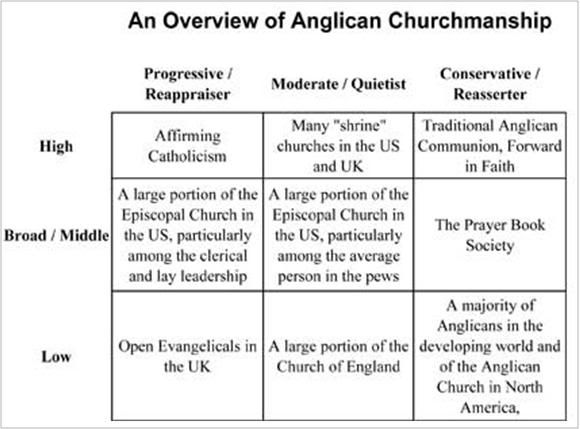 The broad picture shown above gets a bit more detail - but becomes infinitely more confusing - in this Field Guide on Anglican Churchmanship:
The broad picture shown above gets a bit more detail - but becomes infinitely more confusing - in this Field Guide on Anglican Churchmanship:
home.comcast.net/~acbfp/churchmanship.html
which is far more confusing even than the Evangelical Protestants because the latter, at least, identify themselves by denomination.
All I can say is that it's almost a relief to think that Western Catholicism is more or less divided only into two: the orthodox [who follow the Gospel, Tradition and the Magisterium obediently on the strength of faith - and I would include the Lefebvrians among this); and the dissenters (the cafeteria Catholics for whom 'anything goes', 'anything' being what pleases them and therefore, what they think the Church should preach).
10/27/09
P.S. Carl Olson at Ignatius Insight also reacted yesterday to Gibson's article:
insightscoop.typepad.com/2004/2009/10/benedict-xvi-is-ultraconservative-no-a-reformer-no-a-closet-libe...
He is much kinder than I am, as he attributes Gibson's off-kilter conclusions merely to his lideral ideological bias. He does not point out Gibson's apparent ignorance of basic facts that a writer on religion owes it to himself and to his readers to know, or at least look up before making uninformed comments.
He does point out the relevant excerpt from the joint statement by the Archbishops of Westminster and Canterbury on Oct. 20 that makes it very clear what kind of Anglicans the Pope's opening is intended for - where Gibson appears to believe anyone who does not favor women and gay priests would automatically qualify!
Today’s announcement of the Apostolic Constitution is a response by Pope Benedict XVI to a number of requests over the past few years to the Holy See from groups of Anglicans who wish to enter into full visible communion with the Roman Catholic Church, and are willing to declare that they share a common Catholic faith and accept the Petrine ministry as willed by Christ for his Church.
[Modificato da TERESA BENEDETTA 19/11/2009 19:38] |
| |
 26/10/2009 14:50 26/10/2009 14:50 |
|
| | | OFFLINE | | Post: 18.719
Post: 1.367 | Registrato il: 28/08/2005
Registrato il: 20/01/2009 | Administratore | Utente Veteran | |
|
 Monday, Oct. 26
Monday, Oct. 26
 Blessed CONTARDO FERRINI(Italy, 1859-1902)
Blessed CONTARDO FERRINI(Italy, 1859-1902)
Lay Franciscan, 'Patron of Universities'
A renowned legal expert who taught at various
universities, he learned a dozen languages,
wrote a great deal on faith and science, and
performed his lay apostolate both with the
Third Order and the Society of St. Vincent
de Paul. He was beatified in 1947.
No OR today.
THE POPE'S DAY
The Holy Father met today with
- Cardinal Nicolás de Jesús López Rodríguez, Archbishop of Santo Domingo (Dominican Republic)
- Cardinal Antonio María Rouco Varela, Archbishop of Madrid
- Cardinal Severino Poletto, Archbishop of Turin
- Faculty, Students and Staff of the Pontifical Biblical Institute. Address in Italian.
The Vatican Press Office issued this statement in Italian and English:
COMMUNIQUE OF THE PONTIFICAL COMMISSION
'ECCLESIA DEI'

On Monday 26 October 2009 in the Palazzo del Sant'Uffizio, headquarters of the Congregation for the Doctrine of the Faith and of the Pontifical Commission "Ecclesia Dei", the study commission made up of experts from "Ecclesia Dei" and from the Society of St. Pius X held its first meeting, with the aim of examining the doctrinal differences still outstanding between the Society and the Apostolic See.
In a cordial, respectful and constructive climate, the main doctrinal questions were identified. These will be studied in the course of discussions to be held over coming months, probably twice a month*.
In particular, the questions due to be examined concern
- the concept of Tradition,
- the Missal of Paul VI
- the interpretation of Vatican Council II in continuity with Catholic doctrinal Tradition
- the themes of
the unity of the Church and the Catholic principles of ecumenism,
the relationship between Christianity and non-Christian religions, and
religious freedom.
The meeting also served to specify the method and organisation of the work.
*10/27/09
NB: The Press Office has corrected the communique - meetings will be 'every two months',
not 'twice a month'. [In Italian, ' bimestrale', not bimensile'.]
[Modificato da TERESA BENEDETTA 27/10/2009 13:03] |
| |
 26/10/2009 16:23 26/10/2009 16:23 |
|
| | | OFFLINE | | Post: 18.721
Post: 1.369 | Registrato il: 28/08/2005
Registrato il: 20/01/2009 | Administratore | Utente Veteran | |
|
 Very grateful to Ignatius Insight for excerpting this because it is very relevant today - with three historic papal initiatives in play: the dialog with the Lefebvrians, the dialog on the primacy of the Pope with the Orthodox, and the offer to Anglicans wishing to convert to Catholicism. And that is why I am posting it here first rather than on the RATZINGER-TEXTS thread.
Very grateful to Ignatius Insight for excerpting this because it is very relevant today - with three historic papal initiatives in play: the dialog with the Lefebvrians, the dialog on the primacy of the Pope with the Orthodox, and the offer to Anglicans wishing to convert to Catholicism. And that is why I am posting it here first rather than on the RATZINGER-TEXTS thread.
No other modern Pope before him probably had to ponder so much about the nature of the Papacy as did Joseph Ratzinger, at a time when he certainly had no idea he would ever become Pope. For him, it was a historical and theological exercise that he first confronted in depth when preparing to take part in Vatican II.
His insight about the Pope's singular role as guarantor of obedience in the Church is particularly applicable in the face of the many and continuing challenges to his authority and Magisterium by bishops of the Church who should know better but don't - or delude themselves that Vatican II 'made them 'equal' to the Pope'.

Excerpted from
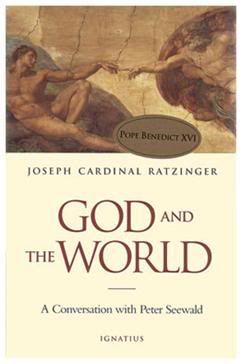
SEEWALD: Many people have the idea that the Church is an enormous apparatus of power.
CARDINAL RATZINGER: Yes, but you must first of all see that these structures are supposed to be those of service.
The Pope is thus not the chief ruler – he calls himself, since Gregory the Great, "Servant of the servants of God" – but [G}he ought to be, this is the way I usually put it, the guarantor of obedience, so that the Church cannot simply do as she likes.
The Pope himself cannot even say, I am the Church, or I am tradition, but he is, on the contrary, under constraint; he incarnates this constraint laid upon the Church.
Whenever temptations arise in the Church to do things differently now, more comfortably, he has to ask, Can we do that at all?
The Pope is thus not the instrument through which one could, so to speak, call a different Church into existence, but is a protective barrier against arbitrary action.
To mention one example: We know from the New Testament that sacramental, consummated marriage is irreversible, indivisible. Now, there are movements who say the Pope could of course change that. No, that is what he cannot change.
And in January 2000, in an important address to Roman judges, he (John Paul II) declared that in response to this movement in favor of changing the indissolubility of marriage, he can only say that the Pope cannot do anything he wants, but he must on the contrary continually rekindle our sense of obedience; it is in this way, so to speak, that he has to continue the gesture of washing people’s feet
The papacy is one of the most fascinating institutions in history. Besides all the instances of greatness, the history of the popes certainly does include some dramatic and abysmal low points. Benedict IX, for example, reigned, even after being deposed, as the 145th pope, as well as the 147th and the 150th. He first mounted the throne of Peter when he was just twelve years old. Nonetheless, the Catholic Church holds fast, with no exceptions, to this office of the vicar of Christ upon earth.
Simply from a historical point of view, the papacy is indeed a quite marvelous phenomenon. It is the only monarchy, as people often put it, that has held out for over two thousand years, and this in itself is quite incomprehensible.
I would say that one of the mysteries that point to something greater is quite certainly the survival of the Jewish people. [To all those Jewish carpers out there: Note how spontaneously Joseph Ratzinger pays homage to the Jewish people!]
On the other hand, the endurance of the papacy is also something astonishing and thought provoking. You have already suggested, with one example, how much failure has been involved and how much damage the office has had to suffer, so that by all the rules of historical probability it should have collapsed on more than one occasion.
I think it was Voltaire who said, now is the time when this 'Dalai Lama of Europe' will finally disappear, and mankind will be freed from him. But, you see, it carried on.
So that’s something that makes you feel: This is not the result of the competence of these people – many of them have done everything possible to run the thing into the ground – but there is another kind of power at work behind this. In fact, exactly the power that was promised to Peter. The powers of the underworld, of death, will not overcome the Church.
|
| |
 26/10/2009 23:00 26/10/2009 23:00 |
|
| | | OFFLINE | | Post: 18.722
Post: 1.370 | Registrato il: 28/08/2005
Registrato il: 20/01/2009 | Administratore | Utente Veteran | |
|
 Pope hails Biblical Institute
Pope hails Biblical Institute
on its centenary year

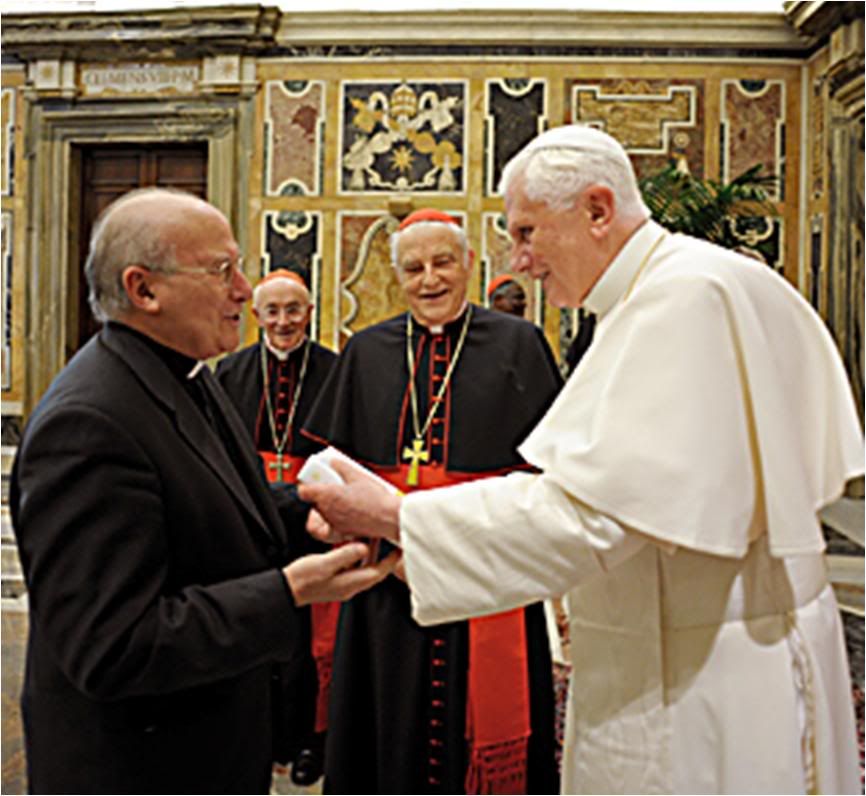
VATICAN CITY, 26 OCT 2009 (VIS) - This morning the Holy Father received members of the Pontifical Biblical Institute which is currently celebrating its centenary. The institute was founded by Pope Pius X.
Benedict XVI greeted Cardinal Zenon Grocholewski, prefect of the Congregation for Catholic Education, and expressed his thanks to Fr. Adolfo Nicolas Pachon S.J., superior general of the Society of Jesus (Jesuits).
The Jesuits, "not without considerable effort, invest financial and human resources in running the Faculty of the Ancient East, the Biblical Faculty here in Rome and the institute's office in Jerusalem", said the Pope. He also extended his greetings to include the rector, professors and students of the Pontifical Biblical Institute.
"This centenary represents a goal and, at the same time, a starting point", said the Holy Father.
"Enriched by the experience of the past, you continue your journey with renewed enthusiasm, aware of the service to the Church that is asked of you: that of bringing the Bible into the life of the People of God that they may know how to face the unprecedented challenges that the modern age poses to the new evangelisation.
"Our shared hope is that, in this secularised world, Sacred Scripture may become not only the heart of theology but also a source for spirituality and for vigour of faith among all who believe in Christ".
The Holy Father recalled that the Vatican Council II Dogmatic Constitution Dei Verbum highlighted "the legitimacy and importance of the historical-critical method, identifying therein three essential elements: attention to literary genres; study of historical context; and the examination of what is often called 'Sitz im Leben'. ...
 Here is a translation of the Holy Father's remarks:
Here is a translation of the Holy Father's remarks:
REMARKS TO THE PONTIFICAL
BIBLICAL INSTITUTE
Eminent Cardinals,
Most Reverent Superior-General of the Soceity of Jesus,
Distinguished Rector,
Distinguished professors and
Dear alumni of the Pontifical Biblical Institute:
With true pleasure I welcome you on the occasion of the 100th anniversary of the foundation of your Institute by my sainted predecessor Pius X in order to constitute, in the city of Rome - as mentioned - a center of specialized studies on Sacred Scripture and related disciplines.
I deferentially greet Cardinal Zenon Grocholewski, whom I thank for the kind words he addressed to me in your behalf. I likewise greet the Superior General of the Jesuits, Fr. AdOlfo Nicolas Pachon, and I take this opportunity to express my sincere gratitude to the SociEty of Jesus which, not without remarkable efforts, has deployed finaNcial investments and human resources to support the Faculty of the Ancient East, the Biblical Faculty here in Rome, and the seat of teh Institute in Jerusalem.
I greet the Rector and the professors who have conseccrated their lives to study and research, constantly listening to the Word of God.
And I greet and thank the personnel, the employees and workers for their much-appreciated collaboration, as well as the benefactors who have given and continue to make available the resources necessary to maintain the structures and activities of the Pontifical Biblical Institute.
I greet all the former almuni who are spiritually with us at this time, and most especially, I greet you, dear students, who have come here from every part of thw world.
A hundred years have passed since the birth of the Pontifical Biblical Institute. In the course of this century, interest in the Bible has certainly risen, and, thanks to the Second Vatican Council, especially the Dogmatic Constitution Dei Verbum - in the elaboration of which I was a direct witness, having participated as a theologian in the discussions that preceded its approval - much more attention and importance has been given to the Word of God in the life and mission of the Church.
This has enabled an authentic spiritual and pastoral renewal within Christian communities, particularly in preaching, catechesis, the study of theology, and the ecumenical dialog.
Your Institute has given its significant contribution to this renewal, with scientific Biblical research, with the teaching of Biblical disciplines, and the publication of meritorious studies and specialized magazines.
Over the decades, various generations of illustrious professors have succeeded each other - I wish to mention among others, Cardinal Bea - who have trained more than 7,000 professors of Sacred Scripture and promoters of Biblical study groups, as well as many experts who are now serving in various ecclesial services in every area of the world.
Let us thank the Lord for this activity which is aimed at interpreting Biblical texts in the spirit in which they were written (cfr Dei Verbum, 12), while being open to dialog with other disciplines, and with various cultures and religions.
Even if the Institute has known difficult times, it has always conducted its activity with constant fidelity to the Magisterium, according to the purposes for which your Institute was founded, which was precisely "ut in Urbe Roma altiorum studiorum ad Libros sacros pertinentium habeatur centrum, quod efficaciore, quo liceat, modo doctrinam biblicam et studia omnia eidem adiuncta, sensu Ecclesiae catholicae promoveat" (Pius PP. X, Litt. Ap. Vinea electa (7 maggio 1909): AAS 1 (1909), 447-448).
Dear friends, the occasion of your centenary represents a goalpost as well as a new point of departure. Enriched by the experiences of the past, continue your path with renewed commitment, aware of the service to the Church that is asked of you, which is to bring the Bible close to the daily life of the People of God, so that they may knowo how to face adequately the unprecedented challenges that modern times pose to the new evangelization.
The common hope is that Sacred Scripture may become in this secularized world not only the soul of theology, but also the source of spirituality and vigor in the faith for all who believe in Christ.
May the Pontifical Biblical Institute continue to grow as an ecclesial center of high-quality studies in the field of Biblical research, availing of modern critical methodologies; and in collaboration with specialists in dogmatics and other theological areas, may it assure a careful formation of future professors of Sacred Scripture who, by learning the Biblical languages and various exegetical methods, may be able to have direct access to Biblical texts.
In this respect, the aforementioned Dogmatic Constitution Dei Verbum, underlines the legitimacy and necessity of the historico-critical method, identifying three of its essential elements: the attention to literary genre; the study of historical context; and examination of what used to be called 'Sitz im Leben' [roughly, identifying the actual life situation to which a Biblical passage refers, i.e., placing it in a pragmatic context]
At the same time, the Conciliar document hews firmly to the theological nature of (Biblical) exegesis, indicating the strong points of the theological method in interpreting Biblical text. This is because the fundamental assumption on which theological understanding of the Bible rests is thr unity of Scripture, and to such an assumption, the corresponding methodology is the analogy of faith, namely, the understanding of single texts on the basis of the whole.
The Conciliar document adds a third methodological indication. Since Scripture is one and the same for the one People of God who are its bearers in history, consequently to read Scripture as a unity means reading it from the perspective of the People of God, from the Church
as its vital site, thus maintaining the faith of the Church as the true interpretative key.
If exegesis also aspires to be theology, it should recognize that the faith of the Church is that form of 'sym-pathy' without which the Bible remains a sealed book: Tradition does not close off access to Scripture but opens it.
On the other hand, the definitive word on the interpretation of Scripture rests with the Church through its institutional organisms.
Indeed, it is the Church which has been entrusted with the task of authentically interpreting the Word of God as written and transmitted, exercising its authority in the name of Jesus Christ (cfr Dei Verbum, 10).
Dear brothers and sisters, as I thank you for this welcome visit, I encourage you to pursue your ecclesial service, in constant adherence to the Magisterium of the Church.
Assuring each of you my support in prayer, I impart to all, as a token of divine favors, the Apostolic Blessing.
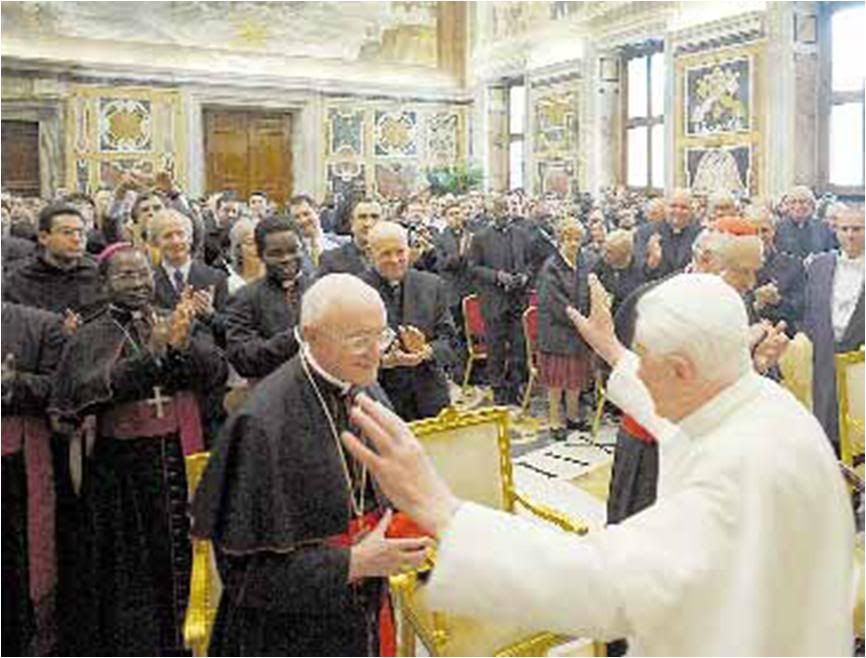 Chart shows current enrolment at the Pontifical Biblical Institute:
Chart shows current enrolment at the Pontifical Biblical Institute:
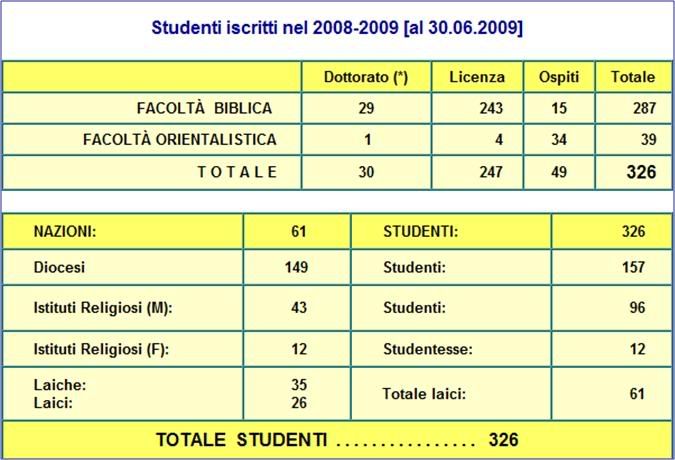
Benaddictive indulgence:
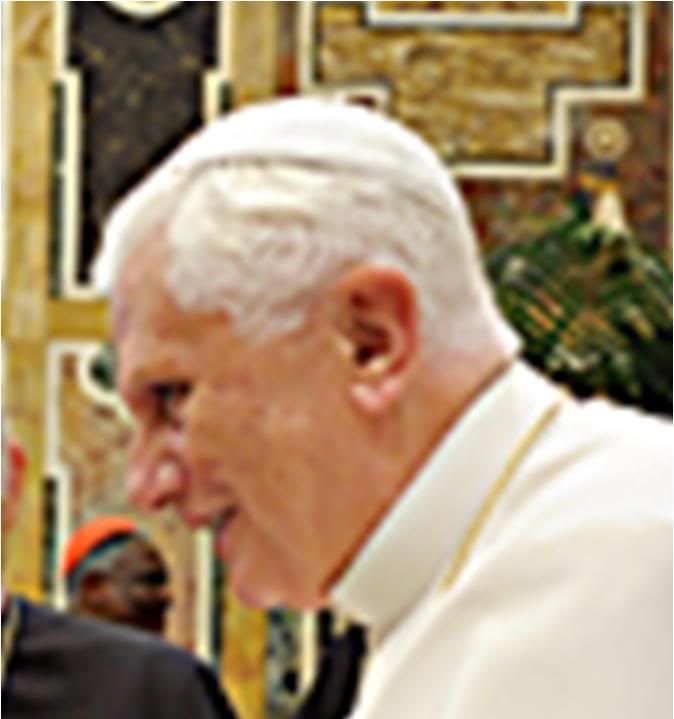
[Modificato da TERESA BENEDETTA 27/10/2009 13:58] |
| |
 27/10/2009 15:08 27/10/2009 15:08 |
|
| | | OFFLINE | | Post: 18.725
Post: 1.373 | Registrato il: 28/08/2005
Registrato il: 20/01/2009 | Administratore | Utente Veteran | |
|
 Tuesday, Oct. 27
Tuesday, Oct. 27
BLESSED BARTOLOMEO DA VICENZA
[also Bartolomeo di Breganze] (Italy, 1200-1271)
Unable to find any image online.
A Dominican who studied with St. Dominic himself; famous preacher,
especially against heresies; Palace theologian to Pope Gregory IX
and confessor to St. Louis IX of France, followed him to the Holy Land
on Crusade; named Bishop of Nimesia in Cyprus, and later of his
native Vicenza in Italy; papal legate to England and France; called
Blessed by popular veneration after his death but not beatified till 1793.
OR for 10/26-10/27/09:


At the closing of the Synodal assembly for Africa, the Pope says the Gospel must be translated
into consistent plans and their realization:
'A promised land for Africa'
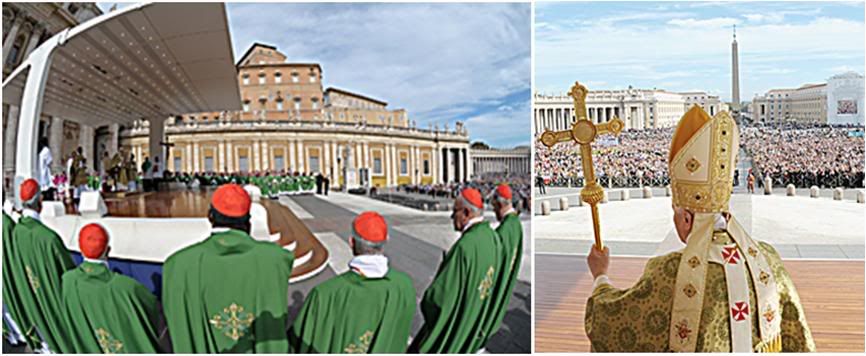 Other Page 1 stories: An editorial on the Synodal assembly for Africa; the Pope addresses the Pontifical Biblical Institute on its centenary (photos in top panel); Baghdad shaken by worst terrorist bombings in 4 years - hundreds die in prelude to January parliamentary elections.
Other Page 1 stories: An editorial on the Synodal assembly for Africa; the Pope addresses the Pontifical Biblical Institute on its centenary (photos in top panel); Baghdad shaken by worst terrorist bombings in 4 years - hundreds die in prelude to January parliamentary elections.
No events scheduled for the Holy Father today.
The Vatican officially announces the program for the Pope's pastoral visit to Brescia on Sunday, Nov. 8.
The Press Office releases the text of a message from Benedict XVI to Karekin II, Supreme Patriarch and Catholicos
of All Armenians, on the tenth anniversary of his election.
In Turin, Cardinal Severino Poletto, who met with the Holy Father at the Vatican yesterday, announced to his diocese
that Benedict XVI will visit Turin on May 2, 2010, for the new Exposition of the Holy Shroud (April 10-May 23).
[Modificato da TERESA BENEDETTA 27/10/2009 18:19] |
| |
 27/10/2009 18:48 27/10/2009 18:48 |
|
| | | OFFLINE | | Post: 18.729
Post: 1.377 | Registrato il: 28/08/2005
Registrato il: 20/01/2009 | Administratore | Utente Veteran | |
|


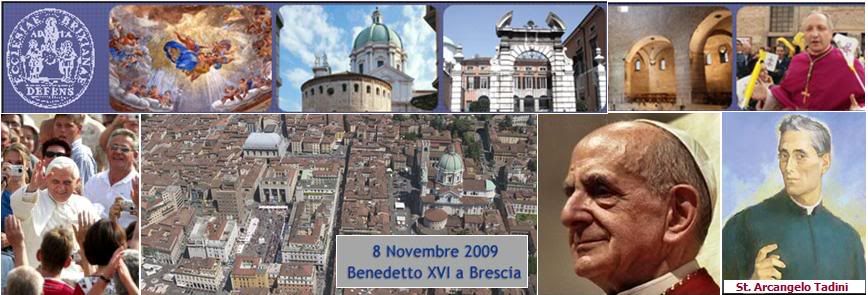
PASTORAL VISIT OF THE HOLY FATHER BENEDICT XVI
TO BRESCIA AND CONCESIO
Sunday, November 8, 2009
P R O G R A M
08.00 Departure from the Vatican heliport for Ciampino airport.
08.30 Departure from Ciampino airport for Brescia.
09.30 Arrival at the Fusco military airport in Ghedi (Brescia province).
En route to Brescia:
- Private visit to the parish church of Botticino Sera and
veneration of the remains of St. Arcangelo Tadini
10.15 WELCOME CEREMONY in front of Brescia Cathedral
and brief visit to the Cathedral.
10.30 EUCHARISTIC CONCELEBRATION at Piazza Paolo VI.
- Homily by the Holy Father
- Angelus prayer and remarks by the Holy Father.
16.00 Greeting the organizers of the visit
at the Paul VI Pastoral Center of Brescia.
16.45 VISIT TO THE BIRTHPLACE OF POPE PAUL VI
and the new headQuarters of the Istituto Paolo VI in Concesio.
17.30 INAUGURATION OF THE NEW HEADQUARTERS and
AWARDS PROGRAM OF THE VI INTERNATIONAL PAUL VI PRIZE
Auditorium of the Istituto Paolo VI.
- Address by the Holy Father
18.15 VISIT TO THE PARISH CHURCH OF SNT'ANTONINO
where Giovanni Battista Montini was baptized.
- Address by the Holy Father.
19.00 Depart Concesio for the Fusco military airport and departure for Rome.
20.00 Arrival at Ciampino airport, then helicopter flight to the Vatican.
[Modificato da TERESA BENEDETTA 28/10/2009 05:14] |
| |
 27/10/2009 19:12 27/10/2009 19:12 |
|
| | | OFFLINE | | Post: 18.730
Post: 1.378 | Registrato il: 28/08/2005
Registrato il: 20/01/2009 | Administratore | Utente Veteran | |
|
 POPE GREETS ARMENIAN PATRIARCH
POPE GREETS ARMENIAN PATRIARCH
ON ANNIVERSARY OF HIS ELECTION
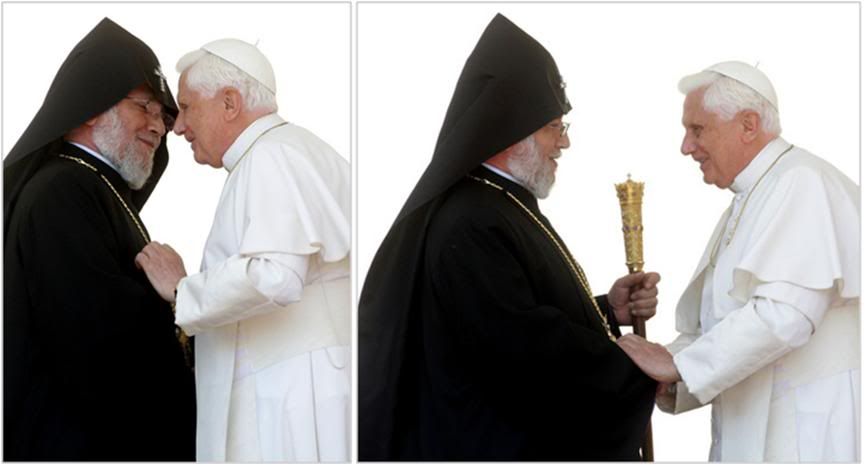 Karekin II and Benedict XVI at the Vatican, May 2008.
Karekin II and Benedict XVI at the Vatican, May 2008.
The Vatican released the text of the message sent by the Holy Father to the Catholicos of Armenia on the tenth anniversary of his election today. The letter was written in English.
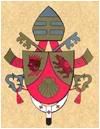 To His Holiness Karekin II
To His Holiness Karekin II
Supreme Patriarch and Catholicos of All Armenians
"Grace to you and peace from God the Father and our Lord Jesus Christ" (Gal 1:3) On the joyful occasion of the tenth anniversary of your election and enthronement as Supreme Patriarch and Catholicos of All Armenians, I extend to Your Holiness my warm fraternal greetings.
I give thanks to God for the blessings he has bestowed on the Armenian Apostolic Church through Your Holiness’s ministry. I also know of your personal commitment to dialogue, cooperation and friendship between the Armenian Apostolic Church and the Catholic Church, clearly expressed by the various meetings that have taken place recently between Your Holiness and the Successor of Peter. I pray that the good relations that have been established between us may continue to grow in the years ahead.
The recovery of freedom for the Church in Armenia towards the end of the last century brought joy to Christians throughout the world. The immense task of rebuilding the ecclesial community fell upon Your Holiness’s shoulders.
What has already been achieved, in such a short time, is truly remarkable: new initiatives have flourished for the Christian education of the young, for the training of clergy, the creation of new parishes, the building of new churches and community centres, as well as the promotion of Christian values in the social and cultural life of the nation.
Your Holiness, I implore Almighty God that, through the intercession of Saint Gregory the Illuminator, we may be ever more closely united in a holy bond of Christian faith, hope and love.
On this significant anniversary, I pray that the blessings of the Triune God may rest upon Your Holiness: may the love of God the Father enfold you, the wisdom of the Son enlighten you and the fire of the Holy Spirit inspire you.
With sentiments of esteem, I assure you of my fraternal affection in the Lord.
From the Vatican, 27 October 2009

 |
| |
 27/10/2009 20:46 27/10/2009 20:46 |
|
| | | OFFLINE | | Post: 18.731
Post: 1.379 | Registrato il: 28/08/2005
Registrato il: 20/01/2009 | Administratore | Utente Veteran | |
|

 The Pope's visit to Turin
The Pope's visit to Turin
set for Sunday, May 2, 2010
Translated from
the 10/28/09 issue of

Veneration of the Holy Shroud, celebration of Mass, followed by the recital of the Angelus, a meeting with child patients from Cottolengo and with the youth of the archdiocese.
This is the program planned for Benedict XVI when he comes to Turin on Sunday, May 2, 2010, according to a pastoral note Tuesday from Cardinal Severino Poletto, Archbishop of Turin.
The note followed his audience with the Holy Father at the Vatican on Monday, during which, the cardinal writes, "maintaining the promise he made to 7,000 Pilgrims from Turin on June 2 last year, the Pope confirmed his decision to make a pastoral visit to the Piedmont capital during the exposition of the Shroud of Turin".
The Pope's day in Turin, the cardinal said, "will be a unique occasion for everyone to meet him, pray for him and listen to the special message that he will bring to the Church of Turin and all the civilian society of the region".
In particular, he added, "Benedict XVI wishes to extend a word of comfort to those who suffer, in keeping with the theme of the Shroud exhibition, 'Passio Christi, passio hominis' [The passion of Christ is the passion of men], and in the spirit of Caritas in veritate, he will give courage and hope to those who are anxious to get a job... in a city which is feeling the consequences of the economic crisis worse than elsewhere".
[Modificato da TERESA BENEDETTA 27/10/2009 20:55] |
| |
 27/10/2009 22:23 27/10/2009 22:23 |
|
| | | OFFLINE | | Post: 18.732
Post: 1.380 | Registrato il: 28/08/2005
Registrato il: 20/01/2009 | Administratore | Utente Veteran | |
|

 Why the Pope draws people -
Why the Pope draws people -
to his books and his audiences
Translated from

Oct. 27, 2009
In a recent General Audience, the Pope referred to "episodes of intolerance and incommunicability, divisions and conflicts" which afflict our time, comparing them to what was faced in his time by Peter the Venerable, who was famed for "his gentleness, his serene equilibrium" and for his "special talent for mediation".
In his message to the Food and Agricultural Organization on World Food Day, the Pope called for "the profound solidarity and farsighted fraternity" necessary in order to use responsibly the gifts of Creation.
And during the concert two weekends ago offered by the Piano Academy of Imola, the Pope pointed out the role of music as "a vehicle more than ever adapted for understanding and union among persons and peoples".
At last Sunday's Angelus, he spoke of "the light of the Gospel" as a force to guide peoples on their journey "towards the realization of one great family".
On October 26, talks began with the Lefebvrians; in early 2010, the Pope will visit the Lutheran Church in Rome and the Great Synagogue.
Meanwhile, Catholic publishing houses saw a 26.7% increase in book sales from last year, thanks to the texts of Joseph Ratzinger/Benedict XVI, and his audiences and Angelus gatherings continue to draw huge crows (just look at the photos to believe).
These are signs of great interest in Benedict XVI. Perhaps because of the controversies, quarrels and recriminations that mark the public debate, it is a welcome pleasure to listen to someone who speaks of peace in gentle and intelligent ways directed not to the gut but to the hearts and minds of those he addresses.
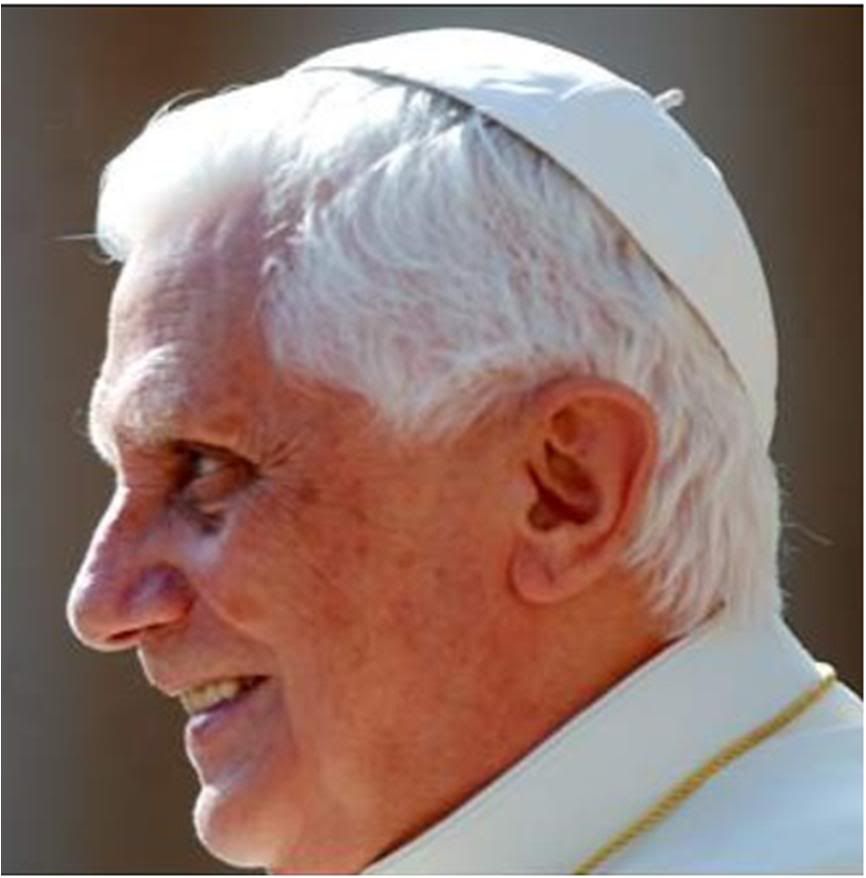 The modest theologian and even more modest Pope:
The modest theologian and even more modest Pope:
'A simple and humble laborer in the vineyard of the Lord'
Sorry I still have no background information on Roberto Pepe - whose 10/21/09 article "This Pope is just getting started..." I translated and posted in the preceding page. But evidently, that excellent article was no fluke, as here is another one in which he gets back at the insufferably arrogant Eugenio Scalfari of La Repubblica and L'Espresso for his most recent insulting putdown of Benedict XVI.
Scalfari's dismissiveness of Benedict XVI:
It's the devil fearful of the Pope
for his incisive work of evangelization
by Roberto Pepe
Translated from

But it's all logical and consequential! One shouldn't be surprised that a small bearded homunculus, weighted down by years and 'authorized' to say whatever comes to his mind - because as a younger man, he held the sacred title of journalist and as an older man, founded a newspaper - affirms that Papa Ratzinger is just 'a modest theologian who makes us lament his predecessors".
Because all he did was to classify the Pope according to the petty intellectual meter of Italian politics, where the words 'love and peace' mean ragtag association and pacifist chic.
Quite apart from the fact that his predecessor John Paul II specifically wanted Joseph Ratzinger to be the guardian of Catholic orthodoxy, at the head of the former Holy Office, precisely because of his theological eminence, Eugenio Scalfari should perhaps clarify - especially since his age may be playing his memory wrong - why in La Repubblica on February 5, 2006, in a Page 1 article on Deus caritas est, he called the present Pope 'the finest of theologians' in an article entited "Evil in the world and God's love", in which he wrote:
"No one can possibly miss the extreme political relevance of this theological text, in an era when (religious) fundamentalisms are on the rise, including those that are admittedly Christian and those who would use Christianity as an instrumentun regni [a tool to rule]."
Well then? Why suddenly come up now with this perverse judgment in a field - theology - in which everyone, admirers and atheist critics alike, consider Pope Benedict unassailable?
The Vatican Curia and all militant Catholics are naturally up in arms against Scalfari's latest dismissal of the Pope, ridiculing Scalfari's self-conferred stature as a super-theologian qualified to judge other theologians.
But this improvident judgment does have a more down-to-earth explanation. Far from expressing theological superiority, it is simply a conclusion reflecting our domestic petty politics.
And so, just as when the Great Pope Benedict spoke of 'universal love' some time earlier, Scalfari immediately referred it to multi-cultural, Marxist, anti-government [specifically anti-Berlusconi] universalism - as advocated by Catholic Marxists of dubious fame such as that Genoese dissident parish priest Don Farinella - so it was that when Cardinal Bagnasco called unacceptable the proposal to institute a Muslim religious hour in Italian public schools, our great journalist-theologian used the occasion to underscore the 'modesty' of Joseph Ratzinger's abilities in the divine sciences, and excluding him from the list of "great Popes (who) fought wars - not only religious ones - but wars for power". (You would think that the re-entry of traditional Anglicans into the Roman Church was no more than a bagatelle!)
Probably Scalfari never even read the preface to Caritas in veritate, where Pope benedict clearly states: "The Church has no technical solutions to offer and does not in the least intend to interfere in the policies of States", or he would have known that it is precisely the obvious oxymoron of 'a powerful modesty' - mystical, not political - which constitutes the winning weapon that makes Benedict XVI great.
I wrote, rather casually a few days ago, that one wonders how could it be that the many signals he laid out at the time of his election as Pope were not perceived as fully as they should have been by the major 'secular' media outlets.
Well, now one can very well say someone did understand those signals very well: the Devil in person, in the guise of a gray-haired newsman, saw at once that the humble actions of a modest priest who was now Pope would result in the most incisive work of evangelization for the Catholic Church this side of 500 years, by a Pope who does not hesitate to say that theology remains a vain dialectic exercise if it is not nourished by a relationship with the Transcendent.
And the Devil is now gripped by fear!
[Modificato da TERESA BENEDETTA 28/10/2009 01:15] |
| |
 28/10/2009 12:17 28/10/2009 12:17 |
|
| | | OFFLINE | | Post: 18.734
Post: 1.382 | Registrato il: 28/08/2005
Registrato il: 20/01/2009 | Administratore | Utente Veteran | |
|
 Wednesday, Oct. 28
Wednesday, Oct. 28
 SAINTS SIMON AND JUDE, Apostles and Martyrs Paintings by El Greco
SAINTS SIMON AND JUDE, Apostles and Martyrs Paintings by El Greco.
OR today.
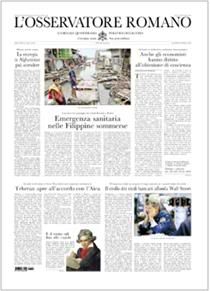 This issue carries the announcement of the Pope's visit to Turin on May 2, 2010,
This issue carries the announcement of the Pope's visit to Turin on May 2, 2010,
and his letter to Catholicos Karekin II of the Armenians. Page 1 stories:
An editorial commentary that economists can exercise conscientious objection to
questionable biotechnologies; the health emergency in the Philippines one month
after unprecedented urban flooding brought about by two typhoons; Obama says
deciding on new Afghan strategy can wait; Iran hints it may accept IAEA proposal
to 'control' their nuclear development program; and in the inside pages, an unusual
tribute to Beethoven and his Missa Solemnis, which opened the concert season
of Rome's Accademia di Santa Cecilia, including a brief musical 'review' of the work
by then Cardinal Ratzinger.
THE POPE'S DAY
General Audience today - The Holy Father's catechesis today was on
the flowering of Latin theology in the 12th century.
The Office of Liturgical Celebrations has released the Holy Father's calendar for November 2009 through January 2010.
[Modificato da TERESA BENEDETTA 28/10/2009 13:56] |
| |
 28/10/2009 12:40 28/10/2009 12:40 |
|
| | | OFFLINE | | Post: 18.735
Post: 1.383 | Registrato il: 28/08/2005
Registrato il: 20/01/2009 | Administratore | Utente Veteran | |
|
 Here's a minor beginning (because it's a brief blog entry, more like notes for further consideration rather than a full-fledged essay) to a more informed reassessment of Benedict XVI's Pontificate and his deliberate method of reform as he approaches the five-year mark as Successor of Peter.
Pope picking up steam?
Here's a minor beginning (because it's a brief blog entry, more like notes for further consideration rather than a full-fledged essay) to a more informed reassessment of Benedict XVI's Pontificate and his deliberate method of reform as he approaches the five-year mark as Successor of Peter.
Pope picking up steam?
By Phil Lawler

October 26, 2009
In April 2005, when Pope Benedict was elected to the Chair of Peter, many of his friends hoped (and his enemies feared) that he would use his new power, quickly and dramatically, to set a new course in Vatican affairs. They were wrong.
Although he was known as a man with strong opinions and a clear sense of what the Church needs, he did not take precipitous action. Within a few weeks it became clear that the new Pope would work carefully, building consensus before making changes.
As the months passed, and no major policy changes were evident, the new Pontiff's friends began to fear (and his enemies to hope) that his pontificate would be a holding action: that he had no major ambitions and no plans for new initiatives. Wrong again.
As his pontificate closes in on the 5-year mark, Benedict XVI is advancing simultaneously on several different fronts. And if he took a long time to launch his policy offensives, his careful planning has ensured that once they are finally begun, his initiatives produce results quickly, and those who oppose his plans are scrambling to find the grounds on which they might mount a defense.
So now Pope Benedict is driving forward with his opening to the Anglicans, his effort to reconcile the SSPX, his bid for a real dialogue with Islamic leaders. There are rumblings about new plans for a liturgical "reform of the reform," and new hopes for a "summit meeting" with Orthodox leaders.
Given the Pontiff's recent track record, it would be foolish to dismiss those rumblings as idle rumors. Along with his habit of careful planning, the Pope has shown an extraordinary ability to catch the world off guard.
No one anticipated that a scholarly address in Regensburg would force Islamic leaders to come to grips with the violence committed in the name of their faith. Before the Pope's decision to lift the excommunications of SSPX prelates, very few people saw it coming. The invitation to the Anglican world came with less than 24 hours of notice.
So what should we expect next week? Next month? Things are traditionally quiet around the Vatican during the summer, and then heat up in the fall. We're right on schedule.
[Modificato da TERESA BENEDETTA 29/10/2009 00:33] |
| |
|
|
|
|